
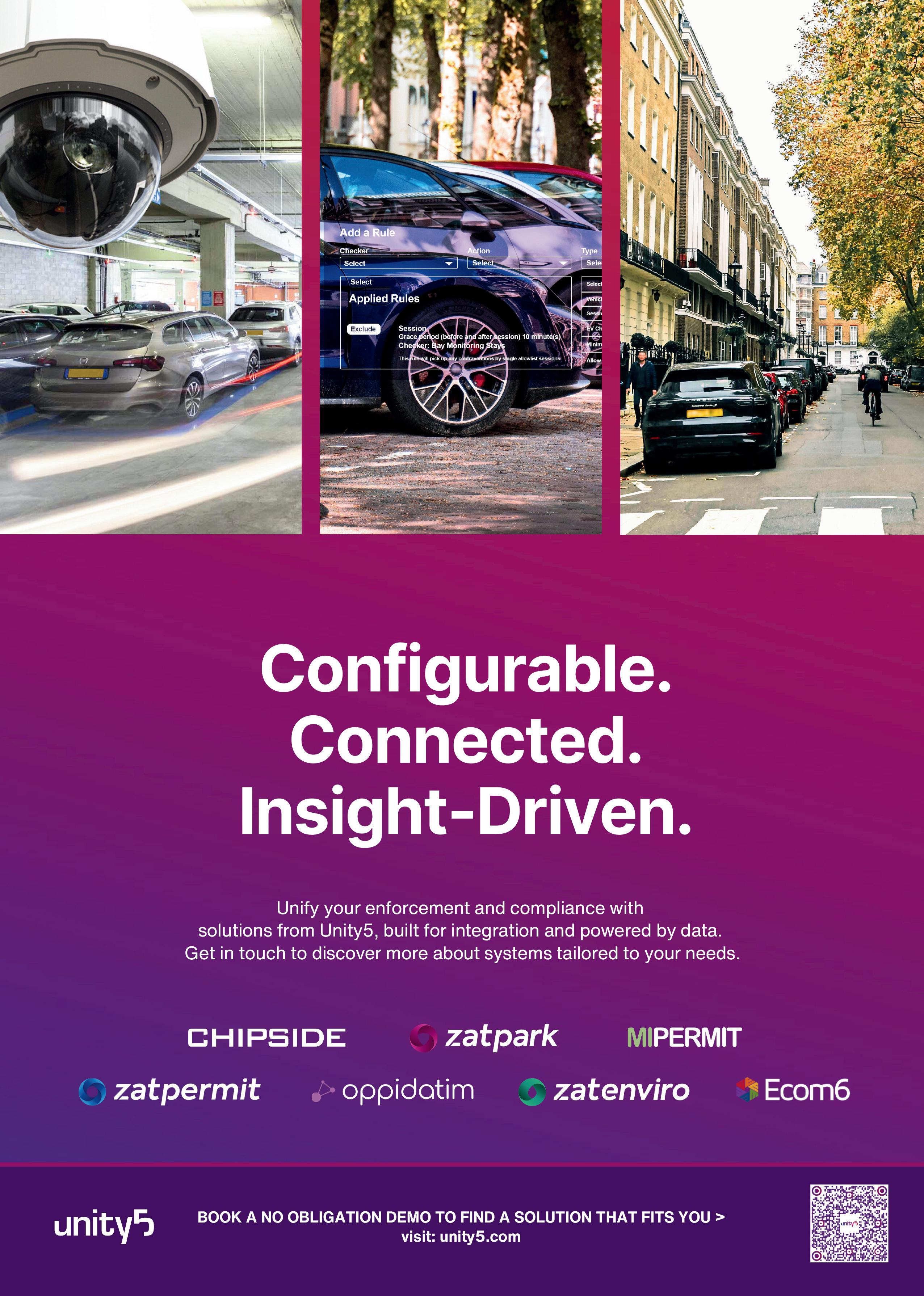


The National Parking Platform seeks to open up the market for cashless payment





The National Parking Platform seeks to open up the market for cashless payment


The National Parking Platform (NPP) is designed to enable drivers to pay for parking run by participating operators on their preferred cashless payment channel, removing the need to sign up to multiple different apps in order to pay for parking. The NPP has been under development at the Department for Transport since 2019, but in the context of a tightening of government budgets, taxpayer funding for the pilot version was withdrawn on 31 March.
The big talking point at Parkex 2025 was that negotiations between the government and the parking sector have ensured that going forward the NPP will be delivered by a not-for-profit company. The NPP Consortium will be led by the British Parking Association with the support of cashless parking providers RingGo, JustPark and PayByPhone. Ten local authorities have so far adopted the open market approach. The NPP Consortium’s new board and management team says it is gearing up to start onboarding the next wave of parking operators. The consortium is also keen to engage with cashless payment providers and technology firms about how they can join the platform.
Mark Moran Editor

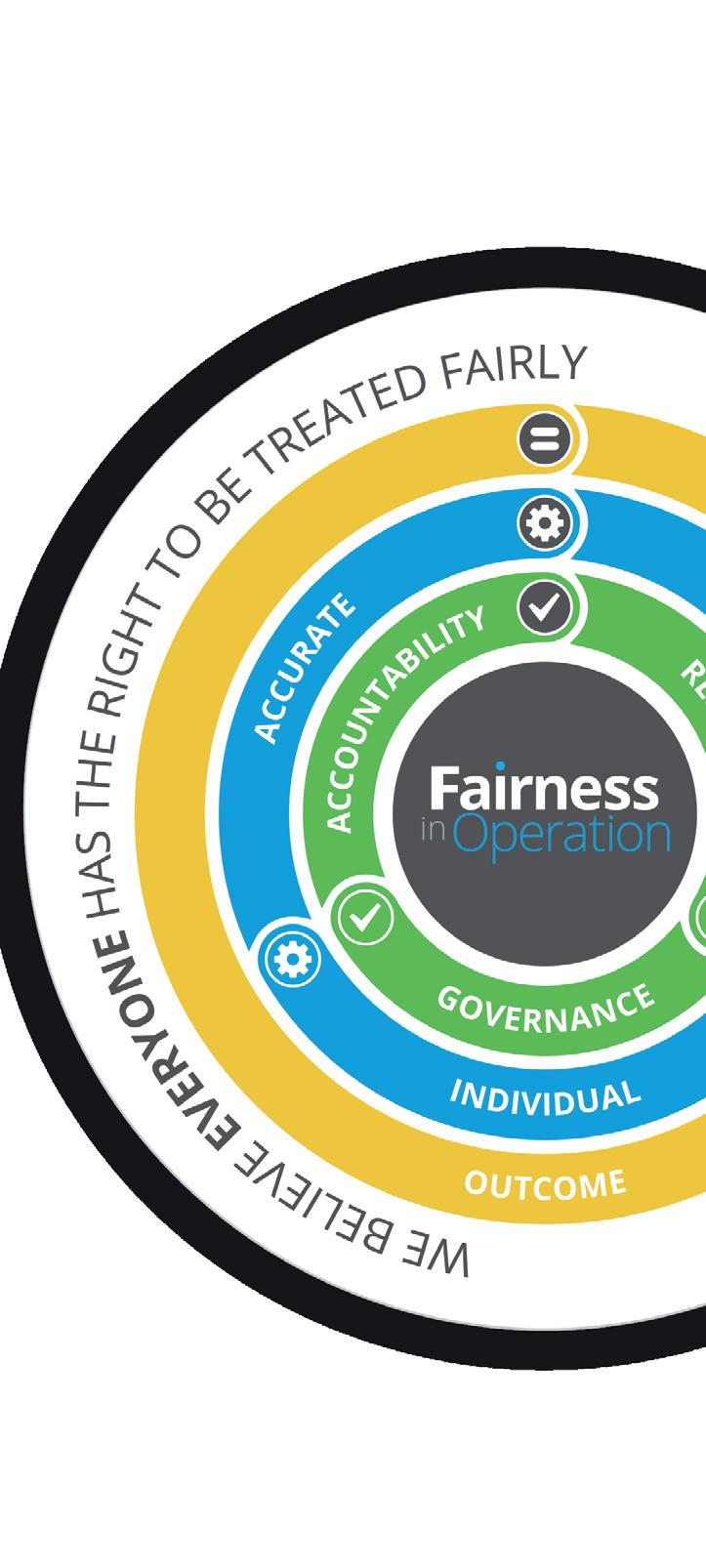


Enforcement Excellence 2025 will explore how public authori琀es and their private sector partners can encourage compliance with the regula琀ons governing how we use roads, car parks, public transport and the urban realm in an effec琀ve and ethical manner.
This respected Landor LINKS conference will discuss policy thinking, legisla琀ve developments and opera琀onal best prac琀ce in the fields of traffic and parking, tackling an琀social behaviour, and the collec琀on of unpaid penal琀es.
Networking opportuni琀es
Enforcement Excellence 2025 will provide an opportunity to meet peers, colleagues and other professionals in both structured discussions and during informal networking sessions, including a drinks recep琀on to close the day.
Exhibi琀ng opportuni琀es
The exhibi琀on will enable a琀endees to check out the latest systems and services on offer.
Exhibitors include:











Speakers and panellists include:
l Mark Frost, Director, Fern Consul琀ng Services (independent technical advisor to the Heathrow Area Transport Forum)
l Ian Gamble, head of sales, Na琀onal Blue Badge
l Kerry Griffiths, digital enforcement manager, Derby City Council
l Russell HamblinBoone, chief execu琀ve, CIVEA
l Mehmet Hassan, senior contract manager, London Borough of Waltham Forest, & Special Chief Inspector, Metropolitan Police
l Stew Laing, global product lifecycle manager, Yunex Traffic
l Jeremy Leach, director and community champion, 20’s Plenty for Us
l Gavin Manger, strategic engagement manager, Landor LINKS
l Mark Moran, editor, Parking Review
l Chris Newman, founder and chief execu琀ve, ScanNeo
l Anjna Patel MBE, trustee, Disabled Motoring UK
l Rob Shoebridge, traffic and transporta琀on, group manager, Derby City Council
l Helen Taverner, head of parking, BCP Council
l James Ward, counter greenwash campaigner, Adfree Ci琀es on behalf of The SUV Alliance
l Karen Weech, commercial director, VREO Innova琀on


Small scale trials of ‘taxi-like and bus-like’ services without safety drivers will be allowed on UK roads from Spring 2026
MPs share their constituents’ concerns as they make case for government regulation of parking on private
Digital parking and mobility solutions provider EasyPark Group has unveiled a new corporate name… Arrive
Parking professionals gathered for a cruise along the River Thames to launch the British Parking Awards 2025
Landor LINKS’s Car Parks 2025 conference discussed structural overload, fire safety and making the most of parking assets
Transport minister Lilian Greenwood told Parkex 2025 that parking will become smarter, fairer and more accessible
Parking professionals gathered at the CBS Arena in Coventry to check out the latest systems and services
The latest policy developments in zero-emission transport




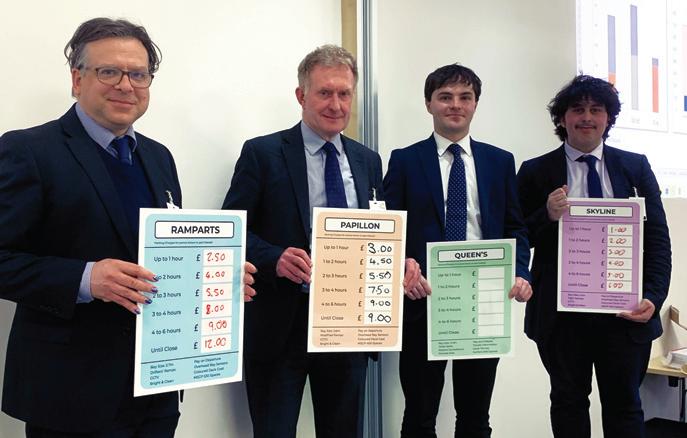

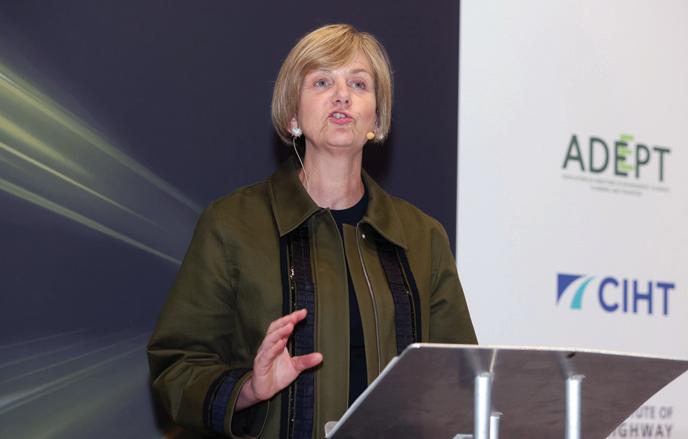




The British Parking Association (BPA) has teamed up with a number of cashless parking providers to take over delivery of a new national payment platform. The government has confirmed that the BPA will now take forward the development and running of the National Parking Platform (NPP).
The platform is designed to enable drivers to pay for parking run by participating operators on their preferred cashless payment channel, removing the need to sign up multiple different apps in order to pay for parking.
Advocates of the NPP say the platform could potentially connect thousands of council and privately-owned parking sites into a single system.
The platform has been under development at the Department for Transport (DfT) since 2019, but in the context of a tightening of government budgets, taxpayer funding for the pilot version was withdrawn on 31 March.
The government says negotiations with the parking sector ensured that going forward the NPP will be delivered by a consortium led by the BPA which includes cashless parking providers RingGo, JustPark and PayByPhone.
Speaking at Parkex 2025, minister for the future of roads Lilian Greenwood said: “This government is on the side of drivers, and dedicated to giving everyone simpler, more flexible parking. I’m delighted that this fantastic project is being taken on by the parking sector with no extra cost to taxpayers.
“This is public infrastructure done right: built by government, shaped with councils, and now delivered by the sector that knows it best, at a time where we’re investing a record £1.6bn through our Plan for Change, to mend our pothole-ridden roads which damage cars, and £4.8bn to deliver new road infrastructure that will better connect people.”
The Department for Transport says the consortium will work with councils to run the NPP on a not-for-profit basis and operate it under clear terms to ensure transparency, sustainability and public value. The government says it will maintain oversight of the platform by monitoring the sector’s compliance with these terms.
So far, the NPP has been adopted by 10 local authorities and now handles over half-a-million transactions a month.
The 10 local authorities using the NPP are:
• Buckinghamshire Council
• Cheshire West and Chester
• Coventry City Council
• East Suffolk Council
• Liverpool City Council
• Manchester City Council
• Oxfordshire County Council
• Peterborough City Council
• Sutton Council
• Walsall Council.
Andrew Pester, BPA chief executive, said: “This announcement marks the result of six years of dedicated work by our parking sector to make paying for parking easier. We’ve strongly supported the National Parking Platform from the start, so we’re thrilled with this outcome and excited to collaborate with the Department for Transport and the new NPP company to create a better parking experience for all drivers.”
The new consortium will be onboarding more local authorities imminently, says the BPA.
There are thought to be at least 30 different parking apps now active in the UK. It is, as yet, unclear whether any of these are onboard the new NPP offer.
Besides PayByPhone, JustPark and RingGo, there are a number of other cashless parking brands, including services provided by emerging payment providers and ones run by parking operators. npp.org.uk


Peter O’Driscoll, former managing director of RingGo, is an advocate of the ‘open market’ in parking:

Sarah Randall has been appointed as the interim chief executive officer of the National Parking Platform. She hopes that NPP will “quietly revolutionise” the parking sector and make it simpler for drivers.
Randall said: “We’re entering an exciting era with the creation of the NPP Consortium. This independent body is looking to carry the platform forward, ensuring it remains scalable, neutral and built around the needs of local authorities, technology suppliers, providers and users as a not-for-profit organisation.”
Randall is chair of the Transport Technology Forum’s smarter parking group. “The TTF’s smarter parking group is supporting this transition, helping to shape a governance model and roadmap that prioritises openness through the standards set out in APDS – the Alliance for Parking Data Standards,” she said.
Randall has over 15 years of experience in parking and transport management. She is currently director of local government and propositions at Agena Group, where she leads strategic initiatives to support innovation and service transformation across local government partnerships.
Previously, she held senior roles in the public sector, including assistant director at the London Borough of Newham and head of parking at Croydon Council, where she was instrumental in modernising services through technology and policy reform.
Randall was named Parking Person of the Year at the British Parking Awards, recognising her commitment to excellence in public service.
Responsibility for the National Parking Platform has been passed from the Department for Transport to a new company called the NPP Consortium, which is led by the British Parking Association.
The consortium is a Company Limited by Guarantee, meaning it has no shareholders, only members,
Being a not-for-profit venture means revenues and surpluses should be reinvested in the service being provided.
The board is led by two directors with significant control, which means they have the power to appoint other directors. These directors are Andrew Pester, chief executive of the British Parking Association, and Keith Williams, a director of Parking Matters, who had a key role in developing the NPP and will be offering expert advice. His brother and fellow Parking Matters’ director, Nigel Williams, has also joined the board as an expert.
The board also features appointed directors. The first three are representatives of major cashless parking providers –JustPark, PayByPhone and RingGo. The appointments are:
• Anthony Cashel, chief operating officer of PayByPhone
• Anthony Eskinazi, president of JustPark
• Christopher Head, managing director of RingGo.
In due course, directors from local authorities will be appointed.
The Department for Transport will also be represented on the board.
It’s rare to be part of something from the ground up that makes life easier on a national scale. After more than six years in development the National Parking Platform has evolved from a governmentbacked pilot under the Department for Transport (DfT) into a fully operational industry-led initiative.
For the first time, competing providers in the marketplace, the British Parking Association and local government have collaborated to make this a reality. The platform enables drivers to pay for parking with participating operators using their preferred cashless payment channel – eliminating the need for multiple app sign-ups.
This achievement wouldn’t have been possible without so many dedicated individuals. Special thanks to Parking Matters for managing the programme, Michael Dnes and Anthony Ferguson from the DfT for having faith in the sector, Westminster Public Affairs for all the public affairs support, my fellow peers at JustPark, PayByPhone, APCOA Connect, AppyWay, Caura and the support of people in RingGo Parking.
Micheal Dnes, head of transport policy at Stonehaven, led the Department for Transport’s work on the NPP:
The government has given the go-ahead to the National Parking Platform – a quiet little bit of magic that will do away with a phone full of parking apps and let people pay through whichever app they choose. It should cut government costs, lower costs to drivers; open the door to innovators working on things like the first parking apps for disabled people; and measurably reduce the amount of swearing nationwide.
I had the good luck to run the NPP project for my last two years in the civil service. It was a very strange project, sitting at the intersection between government, private business, and technical expertise. I described it as being like running a start-up within government; and many of the lessons I learned along the way helped me understand why government doesn’t do start-ups normally. There is a lot in the NPP’s playbook which could be replicated in areas where good policy ideas can’t make progress:
• fixing market structures that block innovation
• funding projects that are generating value but can’t get cash
• unlocking situations where everyone wants to change but no one dares make the first move
• initiatives that can only start with government’s blessing, but where government won’t risk being left holding the baby.
Rod Dennis, RAC senior policy officer, welcomes the NPP, as long as provision is made for motorists lacking access to parking payment apps:
Paying to park a car should be one of the simplest things any driver does, but things have got much more complicated in recent years –a point demonstrated by the fact there are so many different mobile parking apps. If the arrival of a National Parking Platform removes that hassle, it’s definitely a welcome move. But the key will be ensuring as many car park operators as possible sign up to the system. Ten local authorities taking part is a good start, but drivers wherever they are in the country should be allowed to use whatever mobile app they want.
We also believe all councils should provide drivers with at least two methods for paying for parking – with one ideally being using a contactless bank card or mobile phone – for those who can’t use a mobile app, or choose not to.
The government will not be revising the cost of parking and traffic penalty charges issued by local authorities in England and Wales. The Department for Transport (DfT) has confirmed to Parking Review that it has no plans introduce higher caps for parking fines issued outside London.
The department had been considering the case made by local authorities and parking professionals for raising the cap on PCNs. The Local Government Association (LGA) and the British Parking Association feel the deterrent value of the PCN has been eroded by inflation.
There are currently two PCN bands, prescribed in regulations, to reflect the seriousness of a contravention. Outside London the current Band 1 PCN levels are £60 and £40 for respective higher and lower-level contraventions. Band 2 is set at £70 and £50.
Higher charges apply for safety or accessibility reasons such as parking in disabled bays or on yellow lines. Lower charges apply, for example, to overstaying in a paid-for parking bay. The DfT advises that local authorities should choose the lowest band that will help achieve a high degree of compliance. Drivers can settle a fine at a discounted rate if paid within 14 days.
The LGA had suggested the cap should rise to £122 to bring it into line with inflation because the cost of PCNs have not been increased for more than a decade.
The cost of parking and traffic penalty charges issued in London has recently risen for the first time since 2011. New caps of £110 and £160, depending on the offence, came into effect on 7 April. The changes were approved by the Mayor of London, who can act independently of the DfT.
In contrast, changes to the cost of PCNs in the rest of England and in Wales need to be approved by the Department for Transport.
During April, future of roads minister Lilian Greenwood said in a written parliamentary question that the government was ‘reviewing’ the cap. She wrote: “This government believes that transport decisions in London, including the level of penalty charge notices (PCN), should be for the Mayor of London. A group of local government and other stakeholders has submitted research to ministers on PCN levels outside London. The department will consider carefully their findings and recommendations along with other relevant evidence before any decision is taken.”
The proposal to increase the cost of PCNs has also been criticised by motoring groups, who argued drivers would be treated more harshly than shoplifters, who are given £90 fines for stealing goods worth under £200.
Steve Gooding, director of the RAC Foundation, said: “It’s not unreasonable that fees and fines be raised modestly over time, but these changes should be gradual and proportionate, not brought in with a bang when it might appear that the rationale for doing so is more about shoring up local authority budgets than managing traffic and covering costs.”
The fact that the cost of PCNs was being reviewed led to the Daily Mail starting a
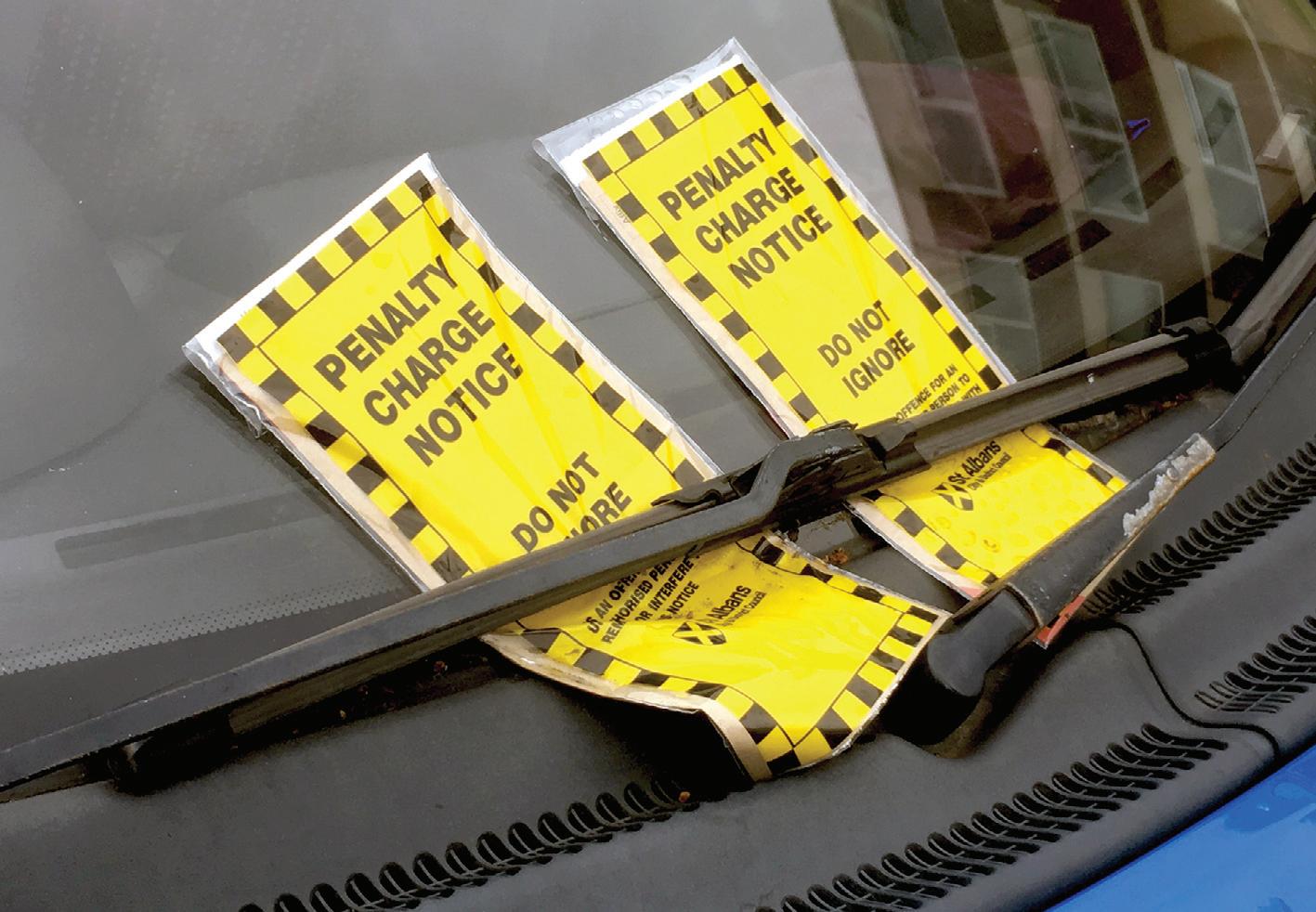

Department for Transport will not revise PCN rates despite call by Local Government Association and British Parking Association
campaign against what it called a ‘75%’ increase in the cost of parking penalties.
In mid-May the Department for Transport told the Mail that no decisions had been made as the issue was being reviewed. The DfT was quoted as saying: “Evidence from stakeholders such as the Local Government Association (LGA) and the British Parking Association (BPA) has been received by the department and will need to be carefully considered before we determine if action is needed.”
However on 20 May, the department issued a new statement to GB News and the Mail that said: “We have no plans to introduce higher caps for parking fines. We are a government firmly on the side of drivers and we fully expect councils to only use penalty charge notices as a deterrent for law-breaking, not as a way to raise funds.”
The Conservative opposition labelled the decision a U-turn. Kevin Hollinrake, Tory local government spokesman, said: “Thanks to the joint work of the Conservatives and the Daily Mail, Labour have been caught red-handed trying to hike up charges on drivers,” said Hollinrake.
“While this apparent U-turn is welcome, the public shouldn’t be fooled. Keir Starmer spent months claiming he wouldn’t betray Brexit, only to bend the knee to Brussels at his socalled ‘surrender summit’ this
week. His war on motorists will continue, with Labour now blocking key Conservative policies that would have curbed unfair parking charges and reduced the spread of Low Traffic Neighbourhoods.”
News that the government would not be revising PCNs outside London was welcomed by Jack Cousens, the AA’s head of roads policy, who said: “The threat of council parking fines being hiked to £100 or more was guaranteed to rile drivers. The punishment has to fit the offence. Thanks to the Daily Mail, and now a listening government, this move by councils and their agents in the parking industry has been scrapped.”
The advocates of increasing the price of PCNs expressed their disappointment at the department’s decision not to act on the evidence they submitted.
The British Parking Association said: “We are disappointed to hear the government rule out a change for now, however we do think a more proactive stance is to delegate this to an independent tribunal to take the politics out of the decisionmaking process, like they do in London. Nobody likes getting a parking ticket. But most people never get one unless they break the rules.”


An LGA spokesman said: “Income raised through on-street parking charges and fines is first spent on running parking services, with any surplus spent on essential transport improvements, including fixing local roads, reducing congestion, tackling poor air quality and supporting local bus services.”

The parking industry in the UK is undergoing a revolution, and WPS is at the forefront. Say goodbye to the frustration of multiple parking app sign-ups – the National Parking Platform (NPP) streamlines payments for a seamless experience.
Are you ready to embrace the future? WPS is your trusted partner for a smooth transition. Our future-proof hardware is fully NPP compatible, ensuring a hassle-free upgrade whenever you’re ready.
Upgrade your parking experience today. Contact WPS to discuss your NPP integration.



An operation cracking down on unofficial parking companies has been carried out after customers’ cars suffered criminal damage and were left with unexplained additional mileage when parked near Bristol Airport.
The joint day of action on 3 June was led by Avon and Somerset Police’s Airport Team working with the Immigration Enforcement Team, North Somerset Council and the Motor Insurance Bureau. The action targeted unofficial parking firms which operate away from the airport site in North Somerset.
Some customers’ vehicles were involved in parking and driving offences. In some cases they were driven by people who were suspected of being uninsured.
A number of vehicles were also returned to their owners in an undriveable or unroadworthy condition, or were left abandoned and in contravention to parking restrictions. Vehicles left in dangerous or obstructive posi-
Customer keys were left in plain sight

Cars were abandoned at the roadside


tions in local villages had to be towed away.
Officers involved in the operation also found and returned 20 vehicles to their owners after unofficial ‘meet & greet’ parking operators failed to give them back, meaning families with young children were waiting several hours to collect their vehicles before they could go home.
One of the images from the operation shows a customer’s vehicle was being used to drive around the area returning keys which were piled up on the front seat and in the footwell, which
were effectively insecure and at risk of being stolen.
Three unlicensed ‘taxis’ were found to be operating which are now subject to an ongoing investigation in partnership with the licensing authorities.
Other suspected offences identified related to having no insurance, immigration and licensing and enquiries are continuing.
Sgt Danielle Hardaway, officer in the case who supported the operation, said: “The last thing anyone wants is the worry over whether their car will be returned to them or not when they return from holiday. We
Local authorities will work with police forces to tackle flytipping on streets, lanes and rural areas, the government has announced.
Councils will be encouraged to work with the police to identify, seize and crush vehicles of waste criminals, with drones and mobile CCTV cameras being deployed to identify cars and vans belonging to fly-tippers so they can be destroyed.
Ministers have launched a rapid ‘red tape’ review to tackle rules preventing councils seizing and crushing vehicles. Councils currently have to bear the significant cost of seizing and storing vehicles, but under new plans being considered by ministers it is the fly-tippers who will cover this cost. In addition, criminals caught transporting and dealing with waste illegally will now face up to five years in prison under new legislation.
Steve Reed, secretary of state for the environment, food and rural affairs, said: “Waste
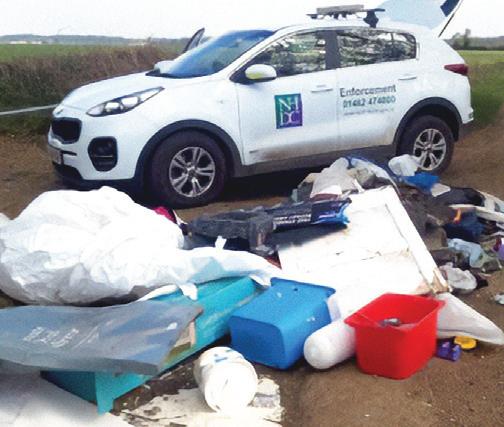
criminals and fly-tippers who blight our towns and villages have gone unpunished for too long. That ends today. The government is calling time on fly-tipping.
“Waste crime is trashing communities across the country. Fly-tipping has skyrocketed by a fifth whilst the number of prosecutions has fallen by the same amount since 2018/19. The failure to punish these criminals has left our high streets, roads and countryside buried under an avalanche of rubbish.”
The Environment Agency will carry out identity and criminal record checks on operators in the sector so there is nowhere
to hide for rogue firms. The agency will be given more resources as it will now be able to fund the cost of policing the industry through permits. The reforms will also give the agency more power to revoke permits, issue enforcement notices and fines.
Philip Duffy, environment agency chief executive, said: “Waste crime is toxic. Criminals’ thoughtless actions harm people, places, and the economy, blighting our communities and disrupting legitimate businesses. At the Environment Agency, we’re determined to bring these criminals to justice through tough enforcement action and prosecutions.”
Jacob Hyler, executive director of the Environmental Services Association (ESA), said: “For too long, criminality has run rampant across the waste sector. These illegal activities threaten the environment; damage communities and undermine legitimate recycling and waste operations.”
ask people to always choose reputable parking operators, and to choose them carefully, and if the price seems too good to be true, then it often is.
“We advise people, when booking parking anywhere, to look for the British Parking Association’s police-backed Park Mark Safer Parking scheme.”
Dave Lees, chief executive, Bristol Airport, said: “We urge everyone to look for the Park Mark accreditation, which all of our car parks have, so they have the peace of mind knowing their vehicle is safely parked while they enjoy their trip away.”
A dispersal order was put in place on roads in Bedfordshire to stop an unlicensed car meet taking place. Dispersal orders give police officers the power to order a group of two or more people to leave an area if they are suspected of committing, or likely to commit, a criminal offence or antisocial behaviour.
Bedfordshire Police used the order to stop antisocial behaviour after a meeting was posted online. The order ran across the weekend of 7-8 June.
The force said: “There was a heightened police presence within Bedfordshire, as well as coordination with local CCTV operators, to deal with those who wish to cause unnecessary disruption.
“If any vehicles are used in a manner causing alarm, distress, annoyance to members of the public or likely to endanger the safety to members of the public, we can deal with the driver/car accordingly and robustly.”

New cabinet council cancels transfer of sites to contractor Corserv
Cornwall Council has decided to scrap the planned transfer of 19 council-owned car parks to its contracting arm Corserv Solutions.
The new Liberal DemocratIndependent coalition has reviewed the car park deal and a plan to sell off Cornwall Airport Newquay, put forward by the previous Conservative administration. The new cabinet decided to cancel the deals in order to protect what it regards as vital services and key assets.
Cllr Leigh Frost, leader of Cornwall Council, said: “We’ve listened to the views of our residents and taken action to put Cornwall first. Reversing these decisions protects our airport and car parks for the benefit of our communities, our economy, and our future. This is about common sense, getting back to basics and making sure our public assets work for the people of Cornwall.”
The car park plan involved transferring 19 car parks to Corserv Solutions, which would have installed ANPR enforcement cameras at the sites. Corserv would have had a fiveyear contract.
Corserv Solutions is a contractor owned by Cornwall Council. It was established to


provide infrastructure, engineering, jobs, social care, facilities management, inward investment, transport and other essential services in Cornwall and beyond. It works on environmental maintenance, adult social care, coordination and support of volunteer groups, school crossing patrols and contracts with local businesses.
Corserv brands are Cormac, Cornwall Airport Newquay, Corserv Care and Corserv Facilities. These are all brought together under the Corserv banner, where Corserv itself provides shared back office functions such as human resources, legal and finance. The group operates with Cornwall Council as its major shareholder. Any profits made by the group are returned to the council as a dividend to then reinvest in frontline services.
While Corserv is a councilowned company, more than 1,000 people signed a petition in a bid to stop the deal.
Cllr Adam Paynter, deputy leader of Cornwall Council, said: “The backlash on the car park plans was clear – residents feared hidden fee hikes and reduced accountability. And with the airport, there was no guarantee that privatisation would deliver long-term benefits for travellers or local businesses. That’s why we’re reversing both decisions.”
Cllr Dan Rogerson, portfolio holder for transport, said: “Our car parks are important for helping town centres and local businesses thrive. By keeping them under Council control, we can focus on what matters to people – fair prices, good services, and decisions made in the best interest of the residents of Cornwall.”
Cllr Tim Dwelly, portfolio
Surrey Heath Borough Council has conducted a review of land and property to identify surplus assets. The council is looking to sell any “discretionary” assets that do not generate revenue.
The council must shed £1.74m this year through savings, reduced interest payments and a further £500,0000 from “service delivery reviews”.
Alan Ashberry, portfolio holder for parking services, told the council’s performance and finance scrutiny committee that parking was a “discretionary service”. He said: “This council’s precarious financial state means that if a discretionary service is not being funded by those that use it, it should be discontinued and not subsidised by council tax payers.”
The council’s executive has already approved the sale of the 40-space Woodend Road Car Park in Deepcut. Proceeds of the sale will be used to support discretionary services provision.


The Liberal Democrat-run council says the decision to sell the car park supports a manifesto commitment to ensure assets are used efficiently and in ways that deliver greater benefit for the wider community.
The sale of the Woodend Road Car Park was deemed necessary to help the council’s debt and support fiscal responsibility. The car park, identified as becoming surplus to operational requirements in the near future, is expected to remain operational until the new car park at nearby St Barbara’s Church opens. This is anticipated
holder for resources, said: “Our airport is vital for keeping Cornwall connected, supporting tourism, and creating jobs. These assets belong to the people of Cornwall, and we have a duty to protect them. Passing control of them to outside organisations would have risked losing local oversight and public trust. We’re now focussed on finding the best way to manage these services, so they stay affordable, sustainable, and accountable to the people they serve.”
The airport plans involved negotiations to secure a private commercial partner for the airport last year. The Cornwall Airport Newquay estate also includes the Aerohub Business Park, Kernow Solar Farm, Spaceport Cornwall, and 200 acres of undeveloped land.
The plan would have seen a private company shouldering some of the £4m subsidy the authority currently spends on the airport.
Responding to the cancellation of the airport sale process, John Brown, chief executive of the Cornwall Chamber of Commerce, said: “We’ve always been clear, explore options thoroughly and effectively and if it works for Cornwall great, if it doesn’t then move on decisively so we can all work together on making the most of this unique and outstanding asset. Now that a decision has been made, let’s not rest on our laurels.”
within three months of its completion, or until December 2026 at the latest, whichever comes first.
Cllr Kel Finan-Cooke, portfolio holder for property and economic development, said: “This decision was not taken lightly, but we are committed to using our resources wisely to deliver lasting value for our community. By making these tough decisions, which we recognise potentially impact a limited number of residents, we’re able to continue protecting funding for discretionary community services that support our most vulnerable groups across the borough.”
The council says it has faced substantial financial challenges in recent years, including high inflation, increased interest rates, reset reserve balances and carries a significant debt burden.
There are also concerns that car park revenues do not meet the cost of upkeep. Last year the council car parks generated £1.8m in revenue. But the council has spent about £600,000 on new lifts and stairwell refurbishments across its sites.
Local authority takes over city centre retail parking site
Portsmouth City Council has taken over the management of the Market Way car park in the city centre, bringing it more in line with other council car parks in the area and offering new payment options for people parking and visiting shops.
The site was previously managed by National Car Parks (NCP).
Since 16 May, the car park has offered cheaper hourly prices for people who need to drive and park in the city centre for short stays (less than four hours).
The car park is now being operated on a pay-when-you-park basis, rather than the previous pay-on-exit system. Customers are able to pay for parking with coins or via the RingGo app, with contactless card facilities being introduced during June. In a first for the city, solar-powered parking machines will be installed.
As with other council-owned car parks in Portsmouth, no QR codes will be used on parking machines and disabled people with Blue Badges can park for free.
Previous season tickets offered by NCP will no longer be offered at this car park, but other NCP car parks in the city will remain available. New season tickets will


be available from the council.
The car park will be run in line with policies set out in the council’s Parking Strategy, which aims to support businesses in the area and strengthen the city’s economy as part of Portsmouth’s integrated transport strategy. The council encourages people to visit the shops on Commercial Road by walking, cycling, taking the bus, or using park & ride, but says Market Way car park remains a convenient option for those who need to drive.
In the future, other sustainable transport options may be offered in the car park as
travel within the city evolves, including electric vehicle charging points, rental e-scooter and e-bike docks, and parking for bicycles.
Cllr Peter Candlish, cabinet member for transport, said: “We’re pleased to take over and improve the Market Way car park, making it more like other council car parks and boosting the Portsmouth city centre economy. We’d still encourage most people to take the bus including park & ride, or walk or cycle whenever possible, but for those that need to drive and park, this will help get people to get to shops, businesses and attractions.”

Transport for London looks at introducing annual price increases
Transport for London (TfL) is proposing to increase the daily Congestion Charge to £18 from January 2026 to ensure it remains effective. This will be the first increase since 2020.
There is also a plan to move to incremental annual increases as with public passenger transport fares.
A Cleaner Vehicle Discount has been proposed as way incentivising the use of cleanest possible vehicles while managing traffic and congestion in London.
In its revisions to the Congestion Charge, TfL is proposing that from March 2027 the residents’ discount will be available only for electric vehicles. This will apply and for new applicants only.
The proposed new discount will be introduced in two phases:
From 2 January 2026:
• 50% discount for electric vans, Heavy Goods Vehicles (HGVs), light quadricycles and heavy quadricycles registered for Auto Pay
• 25% discount for electric cars registered for Auto Pay.
The Congestion Charge will rise to £18 per day


From 4 March 2030:
• 25% discount for electric vans, HGVs, light quadricycles and heavy quadricycles registered for Auto Pay
• 12.5% discount for electric cars registered for Auto Pay.
The proposals were launched in a public consultation that runs until 4 August 2025.
TfL said it has assessed the proposals in the consultation against a ‘do nothing’ scenario, which would include the end of the current version of the Cleaner Vehicle Discount (CVD) on 25 December 2025. Without the changes proposed, TfL estimates
next year alone around 2,200 more vehicles would use the Congestion Charging Zone on an average weekday during charging hours, which would lead to increased congestion and undermine the current scheme.
To provide support for people and businesses who have invested in, or are considering switching to an electric vehicle, TfL is proposing a new CVD from January 2026 that has a higher discount for journeys that are harder to switch to walking, cycling and public transport, such as those made by vans for commercial purposes.
The discount would change
A temporary congestion charge could start in Oxford in the autumn. Oxfordshire County Council is consulting on a scheme designed to reduce congestion in the city centre.
The major Botley Road route has been closed since 2023 due to Network Rail’s £161m Oxford Station Enhancements Project. A traffic filter scheme intended for the area has been severely delayed by a range of problems, including the unearthing of a Victorian brick archway on the site.
The Botley Road traffic filters – which will ban car traffic on six roads in the city at certain times – are needed to reduce congestion, make bus journeys faster, allow for new and improved bus routes, make walking and cycling safer and reduce local air pollution.
The council has been exploring ways to reduce traffic congestion until the traffic filters trial can start. The temporary congestion charge
has emerged as a solution. Oxfordshire estimates that the congestion charge will cut traffic across Oxford by 20% and up to 50% on some routes.
Under the proposals, the charge locations would be exactly the same as the traffic filter points. The scheme could make use of the infrastructure and back-office systems intended for traffic filters.
The scheme would be enforced using automatic number plate recognition cameras (ANPR) positioned at the listed congestion charge locations.
The congestion charge would remain in place until Botley Road re-opens, after which it would be replaced by the traffic filters trial. Network Rail estimates that the Botley Road scheme will be completed by August 2026.
After a public consultation, a report will be presented to the council’s cabinet. If approved, the scheme would be
over the timeframe outlined in the consultation to give support to those making the green transition, while also keeping London moving.
TfL says the new approach builds on an ongoing package of support from City Hall for businesses to switch to zeroemission, including the Mayor of London’s scrappage scheme which has provided financial assistance to help eligible London residents, businesses and charities, to scrap, donate or retrofit vehicles that do not meet the Ultra Low Emission Zone emissions standards.
Delivered jointly by the Mayor and TfL, the Mayor’s Air Quality fund (MAQF) has provided boroughs with £27m in funding, matched by £20m in funding and resources from boroughs and partners to help projects working to improve air quality in the capital. This is alongside action to increase the number of public electric vehicle (EV) charging points in the capital to 40,000 by 2030.
The Congestion Charge is levied in parallel to the Ultra Low Emission Zone (ULEZ) and the tolls that will apply on the Silvertown and Blackwall Tunnel river crossings.
implemented later in the autumn. There would be a daily charge of £5 to go through six charge locations on roads in Oxford until the end of the day.
The council said surplus income from the congestion charge scheme could be used to fund travel improvements such as cheaper bus tickets and park & ride sites.
The charge would apply to cars without a permit. Permits would be available for certain groups, including community health and care workers, carers, Blue Badge holders, school students with special educational needs, mobile traders and frequent hospital patients – exactly the same as for the planned traffic filters trial, said the council.
As with the planned traffic filters trial, residents in the wider Oxford permit area would be eligible for 100 day passes, with residents in the Oxfordshire permit area getting 25-day passes.
London Assembly members are calling on the Mayor of London to back an increase on vehicle taxes and parking fees for drivers of SUVs (sports utility vehicles) in the city.
Assembly members have agreed a motion calling on Sir Sadiq Khan to take action over fears the increasing size of cars is damaging roads, causing congestion and putting other road users at greater risk of death and serious injury.
The assembly called on Mayor Khan to ask HM Treasury to amend Vehicle Excise Duty (VED) to include a tax based on vehicle weight.
The motion wants the mayor to ask London’s boroughs to consider charging more for parking larger cars such as SUVs.
The mayor is also being asked to call on the Department for Transport to introduce stricter limits on the size and bonnet height of passenger vehicles.















Forecourt contract covers Manchester, London Stansted and East Midlands Airports
Manchester Airports Group (MAG) has selected APCOA to provide barrierless terminal forecourt solutions and associated services at Manchester, London Stansted and East Midlands Airports.
APCOA has introduced barrierless technology on forecourts and within parking operations to provide customers with a seamless process for entry and exit, together with a range of payment options.
The barrierless solutions are designed to improve traffic flow around the airports and remove ‘tailgating’ fraud.
Services at all three airports are now live following a phased roll-out.
The systems are supported by APCOA’s cloud-based Parkway system, which integrates technology, automation and data across vehicle detection, customer channels, payment reconciliation and enforcement.
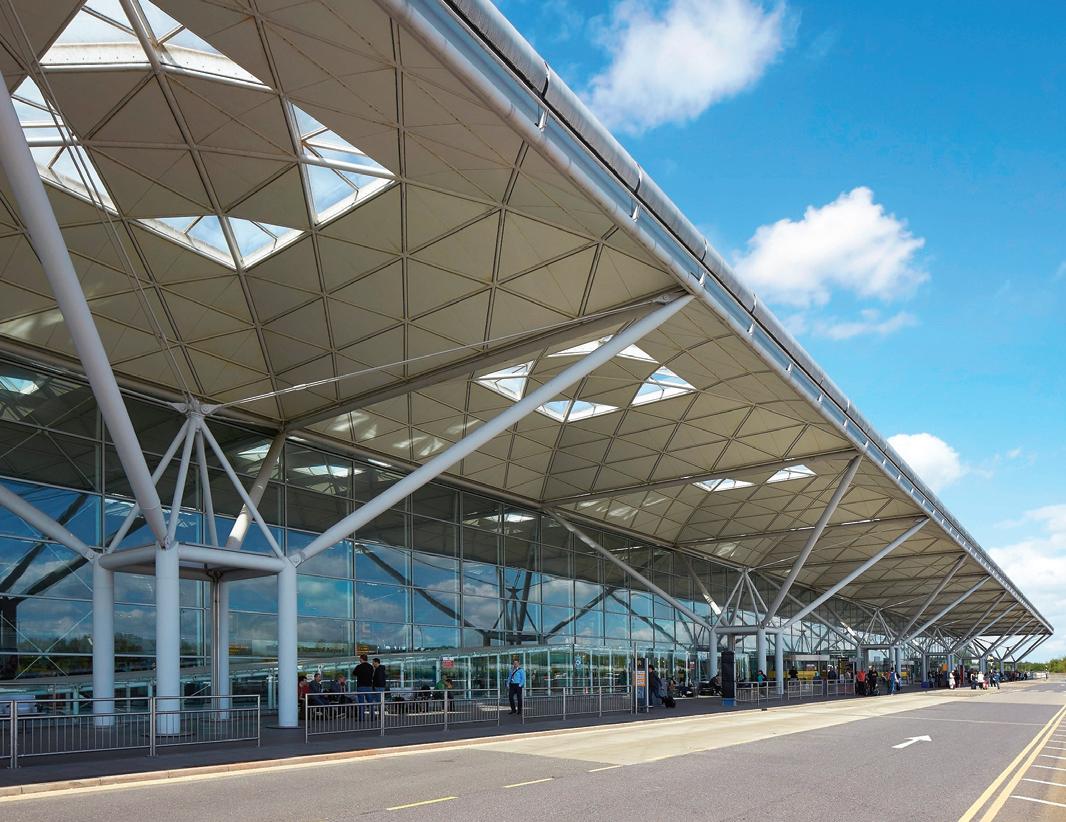
MAG chief information officer Nick Woods said: “APCOA’s existing experience in the airport sector and the excellent collaboration between the teams has led to the successful roll out of the new barrierless systems across our three airports.”
Kim Challis, APCOA’s regional managing Director (UK and Ireland) added: “We are delighted to have worked with the MAG team to deliver this major improvement programme across their estate.

APCOA has been awarded the contract to manage parking activities at Utilita Arena Birmingham. The contract was awarded by NEC Group Arenas via a competitive bid process and comes with a term of up to ten years. It encompasses management of over 2,000 parking spaces across three separate car parks, with pre-booking and on-the-day parking both available.
All three car parks are operated using APCOA’s Parkway automatic number plate recognition (ANPR) technology, a barrierless solution designed to minimise queues and reduces emissions.
Jen Mitchell, NEC Group Arenas managing director, said: “We’re pleased to be partnering with APCOA to enhance the parking experience at Utilita Arena Birmingham. We’re confident visitors will enjoy a more positive parking experience as a result of the partnership.”
A woman who hides her face behind a slice of bread has created TikTok videos to challenge Manchester City Council’s signage policies, which she says lead to drivers being wrongly fined.
The campaigner, who goes by the online alias Zoë Bread, received a parking notice after buying a ticket at the wrong meter when parking on a car park Collier Street.
The T-shirt designer and filmmaker says a ‘Pay at Machine’ sign pointed both to a private car park and a council one.
During her investigations into the parking problems on the road Zoë Bread submitted a Freedom of Information request to the council, but after it was rejected she started looking through official documents on the number of PCNs issued on the road.
By looking through the council’s data, Zoë Bread established that the opening of a private car park run by SIP between May 2018 and April 2019 corresponded with an


increase in the number of fines being issued by the council on the adjacent road.
Manchester City Council has said it will explore if additional signage is needed.
Council leader Bev Craig thanked Zoë for drawing attention to the situation. Craig said the signs on the street complied with all the rules, but that there would be changes.
“We’re going to address this as soon as possible with new signs, by relocating the meter and by asking the owners of the nearby private car park to take down their signs which
have contributed to confusion,” said the mayor.
“As a goodwill gesture, we will also quash any pending or unpaid tickets relating to Collier Street – including Zoë’s – and review our records of fines for the last 12 months in that location. We will refund anyone who said at the time that they believed they had paid for their parking.”
Zoë Bread told the BBC: “The only part of it that I think is bad is the amount of effort it took to get heard, which is obviously not possible for a proper person to do.”
“It’s been a complex mobilisation, but APCOA has extensive experience in the airport sector and our digital solutions are already delivering improved customer service at all three airports.”
APCOA’s Parkway solution supports MAG’s environmental objectives of encouraging a shift towards sustainable forms of transport, improving air quality, reducing noise pollution, and contributing to decarbonisation.
APCOA provides parking services to several other UK airports, and has installed its barrierless solution at London Heathrow and London Luton Airports.
An administrative error appears to have cost an East Midlands council about £40,000 in lost car park revenue. Melton Borough Council in Leicestershire suspended charges in nine car parks during May, covering payment machines so they could not be used.
The council has not detailed what the error was, but said it happened while it was implementing new charges. It said the error had been fixed and charges were set to return.
A council spokesperson told the BBC: “As soon as the error was identified, we moved swiftly to rectify the situation, proactively highlighting the issue and removing all charges during the three-week notice period and prior to the adoption of the new rates.
“It’s estimated the loss of income could be approximately £40,000, but the action taken has ensured residents were not disadvantaged during this period.”
An extraordinary council meeting will be held to discuss the error.



THURSDAY 2 OCTOBER 2025
CITY HALL, BRISTOL BS1 5TR
Event Partners:

Join local authorities, transport operators, planners, developers, and mobility providers for Mobility Hubs 2025 – the UK's leading forum dedicated to the design, delivery and impact of mobility hubs.
Pre-event Tours: Join us on 1 October for exclusive guided tours of multiple live Mobility Hub sites across Bristol – showcasing how the city is integrating shared transport, EV charging, and improved public space
Open to registered delegates only
Be part of the UK’s leading event on Mobility Hubs!
Showcase your solutions, share your expertise, and connect with key decision-makers.
To discuss sponsorship, exhibition, or partnership opportunities, contact Jason Conby on: 020 7091 7895
Policy, Planning & Delivery
l Planning and funding mobility hub networks
l Integrating mobility hubs into local transport strategies
l Designing consistent, flexible, and scalable hub models
l Working with communities and artists to create a sense of place
Types of hubs
l Urban, rural, and regional mobility hubs
l Mobility hubs in new and existing residential developments
l Workplace and campus mobility hubs
l Repurposing car parks and rethinking park & ride
l Modular and small-scale rural hubs
Integrated services
l Connecting hubs with public and active transport
l Delivering shared mobility (e-bikes, scooters, car clubs)
l Providing EV charging infrastructure
l Supporting last-mile logistics and parcel services
l Managing the kerbside and public realm e昀ectively
Operations & commercial models
l Partnering with developers, operators and the private sector
l Governance and ownership models for sustainable hubs
l Creating commercially viable and user-friendly services
l Futureproofing hubs through data, tech and innovation
Trials of self-driving vehicles are set to start in England from Spring 2026, the Department for Transport (DfT) has announced. Transport secretary Heidi Alexander has confirmed that the government will fast-track commercial pilots of autonomous vehicles on England’s roads to Spring 2026. Firms will be able to pilot small scale ‘taxi-like and bus-like’ services without a safety driver for the first time. The vehicles could be made available to members of the public to book via an app.
A potential wider roll-out could take place from the second half of 2027 when the full Automated Vehicles Act becomes law, says the department. The Automated Vehicles Act requires self-driving vehicles to achieve a level of safety at least as high as competent and careful human drivers.
The transport secretary said: “The future of transport is arriving. Self-driving cars could bring jobs, investment, and the opportunity for the UK to be among the world-leaders in new technology. With road safety at the heart of our pilots and legislation, we continue to take bold steps to create jobs, back British industry, and drive innovation to deliver our Plan for Change.”
Self-driving trials have been taking place in the UK since January 2015, with British companies Wayve and Oxa spearheading significant breakthroughs in the technology.
The DfT says the self-driving vehicle trials aim to reduce human error, which contributes to 88% of all road collisions. By having faster reaction times than humans, and by being trained on large numbers of driving scenarios, including learning from real-world incidents, the government says self-driving vehicles can help reduce deaths and injuries.
The DfT also suggests self-driving vehicles could add to new public transport options in rural areas to boost connectivity for local communities, and improve mobility, accessibility and independence for those unable to drive.
Launched during London Tech Week, the commitments are a cornerstone of the department’s new Transport AI Action Plan, which sets out how the government is using AI to drive economic growth, reduce traffic congestion, and improve transport for everyone in the UK (see panel).
The passage of the Automated Vehicles Act 2024 paved the way for the deployment of automated vehicles. These vehicles must be able to safely and legally drive themselves without a human needing to monitor or control the vehicle for at least part of their journey. Section 2 of the Automated Vehicles Act 2024 requires the Secretary of State for Transport to prepare a Statement of Safety Principles that apply to automated vehicles.
This statement will be used in different ways across the safety framework, including:
• when authorisation authorities carry out vehicle type approval and authorisation checks (pre-deployment)
• when regulators carry out in-use monitoring and regulatory compliance checks (postdeployment)
• for annual assessments on the overall performance of automated vehicles.
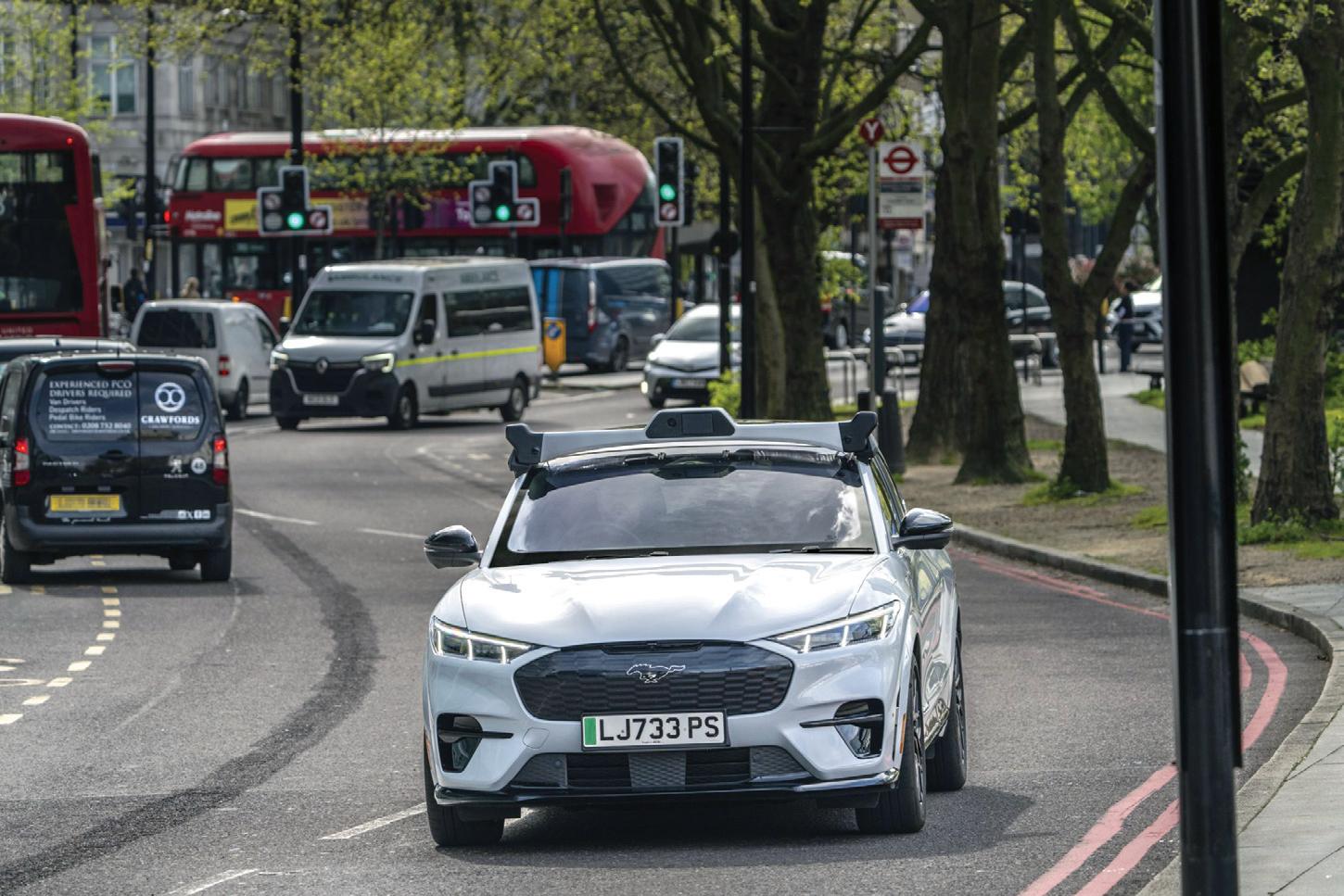

Small scale trials of ‘taxi-like and bus-like’ services without safety drivers will be allowed on UK roads from Spring 2026
The Department for Transport is running a consultation seeking views on what safety standards should be sought for automated (self-driving) vehicles in the UK. The government says it wants to understand how:
• the safety principles may be used
• the safety standard may be described
• safety performance could be measured.
The government is also seeking views on protecting the use of certain terms in vehicle marketing so they can only be used for authorised automated (self-driving) vehicles.
The announcement was welcomed by the automotive and technology sector. Mike Hawes, SMMT chief executive, said: “Pilot rollout of commercial self-driving services from next year will widen public access to mobility, while the consultation will ensure the technology is deployed in a safe and responsible way.”
Julian David, techUK chief executive, said: “The UK must make sure it doesn’t fall behind
The Department for Transport (DfT) has published its Transport Artificial Intelligence Action Plan, which sets out how the government plans to use AI to drive economic growth, reduce traffic congestion, and improve transport across the UK.
Following the 2025 AI Opportunities Action Plan, the new document sets out the approach the DfT is taking to working with artificial intelligence. This includes implementing AI within the DfT to support its business and deploying it across the
other countries despite the promising progress made in recent years to create new, bespoke legislation for AVs.”
The announcement was also welcomed by Alex Kendall, co-founder and CEO of Wayve: “The UK has been Wayve’s home since 2017 –building this technology here has been an incredible journey, from testing our first prototype in Cambridge to deploying the world’s first end-to-end AI driver on public roads, starting in London and expanding nationwide. Accelerating commercial selfdriving pilots to 2026 positions the UK as a leading destination for the deployment of L4 self-driving technology. These early pilots will help build public trust and unlock new jobs, services, and markets.”
Gavin Jackson, chief executive of Oxa, added: “Since 2024, Oxa has advocated for an expedited regulatory regime. Clear rules will open up the market and encourage transport companies to introduce the benefits of autonomous vehicles across the country.”
transport system to both improve transport user experiences and boost growth.
Transport secretary Heidi Alexander said: “We are at a critical moment in the development and deployment of AI in transport and across our society. We have a unique opportunity to shape the future of transport with AI, and to ensure that it serves the public interest.
“AI is not a distant future. It is here and now, and it can change transport for the better. But we need to act now to shape the future of transport with AI, and ensure that it serves the public interest and reflects our common values. This action plan is our roadmap to do just that.”


The need for government to regulate the management of parking on private land was a recurring theme in a Westminster debate that took place on 6 May. The discussion saw Members of Parliament raise concerns about what their constituents feel are the unfair practices of private parking companies. There was a consensus that there is an urgent need to reform the regulation of private parking enforcement, with MPs asking when the government’s delayed Private Parking Code of Practice will be implemented.
The debate was called by Baggy Shanker, Labour MP for Derby South, who started the discussion by stating: “Our constituents are fed up of wrestling with a faulty payment app or an out-of-order ticket machine only to find that they will still be fined. They are fed up of the hassle of appealing a parking fine that should never have been issued in the first place. Most of all, they are fed up of feeling scammed by private parking companies that are unfairly pocketing their hard-earned cash.”
Shanker argued that relying on private parking firms to introduce a voluntary code of practice was a case of allowing them to mark their own homework. He urged ministers to commit to introducing a legally binding code of practice for the industry without further delays. Shanker said: “It is time to say ‘enough is enough’, and introduce a legally binding code of practice to put an end to these extortionate fines.”
Baggy Shanker told fellow MPs: “Earlier this year, I wondered why private parking companies introduced a voluntary code of practice, after years of doing everything they could to block a legally binding code of practice being introduced. To nobody’s surprise, the voluntary code goes nowhere near far enough to stand up for drivers and give them the protections they need. The cap on parking charge notices is still too high. The debt recovery fees are still allowed under the industry code. Put simply, they are setting their own rules and marking their own homework, or at best their mates’ homework. That is just not good enough.”
Private parking companies need to act with fairness and common sense, said Shanker. “To achieve that, we need a robust code of practice put into law, which stands up for drivers and holds these companies to account. Voluntary guidelines are failing drivers.
“We need clear, enforceable rules that cover signage, the grace period, appeals processes and the use of CCTV. We also need to put an end to the threatening letters that use legal jargon to intimidate people into paying fines, and we need caps on those fines. Ultimately, we need accountability.
“I wholeheartedly welcome the Labour government’s determination to drive up standards across the private parking sector by committing to publishing a statutory code of practice. Today, on behalf of every driver who has faced the nightmare of an unfair fine, I urge the minister to commit to introducing such a code without any further delays. Most importantly, the e-mails that flood our inboxes every day show that drivers across the country
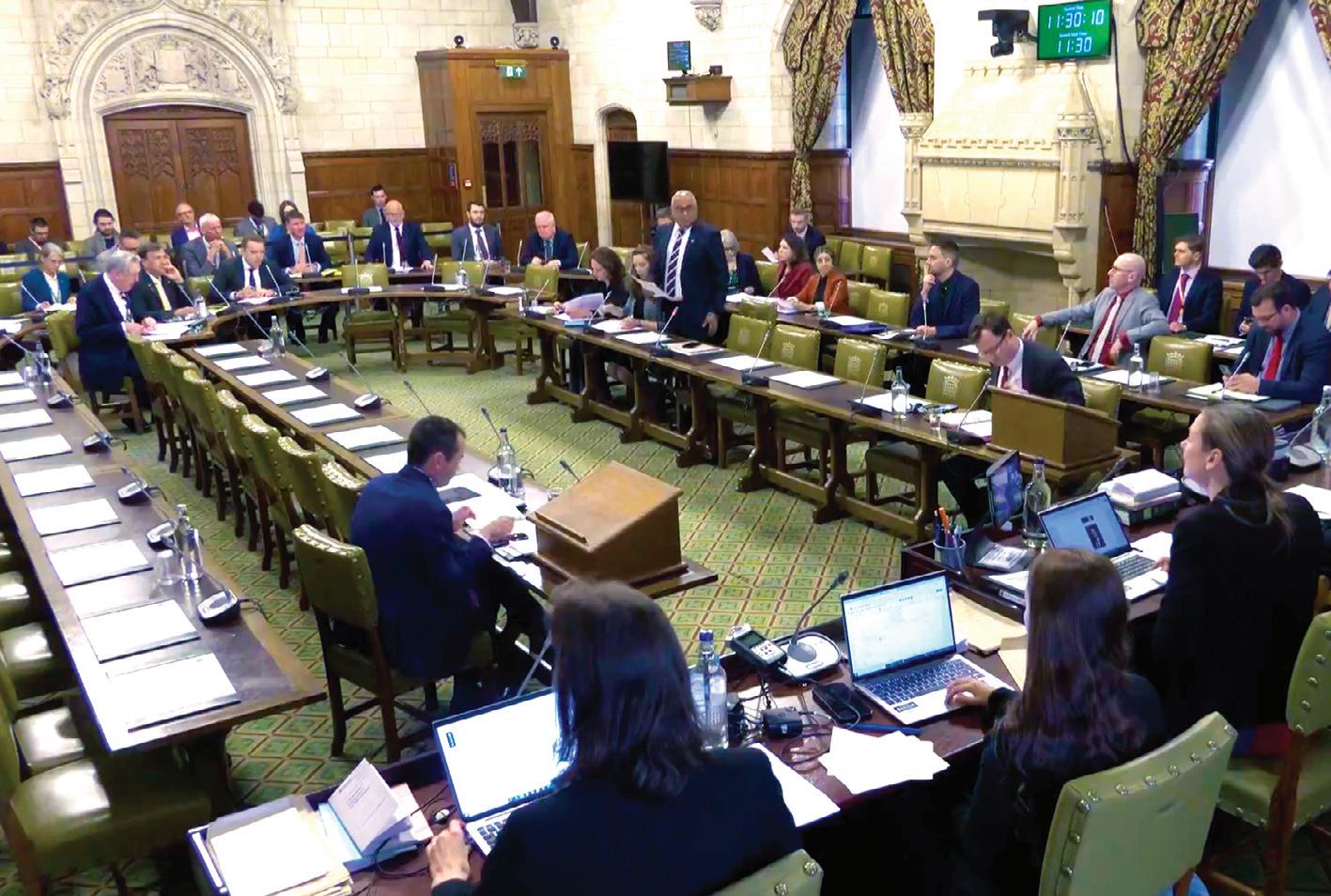

‘Enough is enough’
MPs share their constituents’ concerns as they make case for government regulation of parking on private land
are willing us to stand up for them. Now it is time for action.”
The debate saw MPs share the negative experiences of constituents who had received parking charges for alleged breaches of private parking company terms and conditions.
Responding for the government, communities minister Alex Norris said the government would be bringing forward a legally binding code. He would not give a specific time frame, but said a consultation will be brought forward “shortly”.
Norris said: “On the code of practice, our goal is to find a proper balance to ensure that parking charges and debt recovery fees are fair and proportionate, while providing an effective deterrent against the small number of people who deliberately do not comply. We intend to publish a consultation shortly – and I do mean shortly – to outline where the government are and give everybody a chance to share their views.
“I encourage colleagues from across the House to take part – as always, I am available to meet any and all to hear their views – but I cannot say strongly enough that it is coming shortly.”
The road to delivering a code
The government’s long delayed Private Parking Code of Practice contained guidance on the operation and management of private parking facilities in England, Scotland and Wales. The code set out requirements for parking operators to follow when enforcing parking restrictions on private land. The code of practice was published by the government on 7 February 2022, but withdrawn on 7 June 2022 following challenges by some parking operators. Since its withdrawal, two trade associations serving the parking sector have published a single code of practice.
The British Parking Association (BPA) and International Parking Community (IPC) say their joint code will deliver greater transparency and consistency for motorists. The BPA and IPC have also set up a Private Parking Scrutiny and Advice Panel (PPSAP) to provide oversight of the code’s implementation and operation.
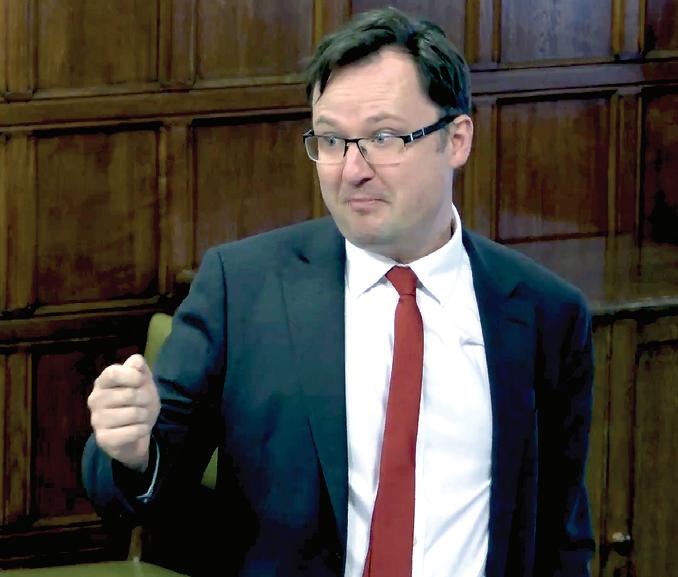

Responding to the MPs’ debate, the BPA said: “The BPA will meet with the minister and MPs who spoke in the debate and remains dedicated to building trust and transparency through continuous improvements and higher standards. The private parking sector plays a vital role in managing parking spaces effectively, with current data showing that 99.77% of parking events occur without incident. This update is a positive step for motorists, ensuring that parking rules keep pace with technological advancements and prevent nuisance and inconsiderate parking, whilst protecting compliant drivers.”
Parking payment providers united under new corporate identity
EasyPark Group, a provider of digital parking and mobility solutions, has unveiled a new name – Arrive.
Arrive will replace EasyPark Group and Flowbird Group, becoming the overarching parent company for the consumer brands EasyPark, Flowbird, ParkMobile, Parkopedia, RingGo, Yellowbrick, Your Parking Space and other brands within the organisation.
Cameron Clayton, chief executive of Arrive, said: “I’m very excited to be able to celebrate the reveal of our company’s new name and brand Arrive.
“Our exponential growth over the past 12 months, especially with the integration of Flowbird and Parkopedia, has dramatically expanded our scope of business and product offerings.
“We need a corporate structure and identity that mirrors our entire portfolio – moving beyond just parking.
“Arrive’s vision of making cities more livable is an inherited testament to the work EasyPark Group, Flowbird Group, and Parkopedia achieved individually over the last 20 years. We are building the world’s leading global mobility platform. We can’t do it alone, we can only do it together with cities, with riders and with drivers. Arrive is tomorrow’s mobility platform.”
The consumer brands and mobile apps, such as EasyPark, RingGo, ParkMobile, and Flowbird, will remain unaffected for the foreseeable future.
Arrive will act as the predom-

Cameron Clayton
inant corporate body to the consumer brands.
EasyPark operates in over 90 countries and 20,000 cities.
The corporate rebrand follows two major acquisitions by EasyPark. In January 2025 it
completed its acquisition of the Flowbird Group, a parking and transportation solutions provider that operates the brands Flowbird, YourParkingSpace, TPARK, Extenso Cloud and Yellowbrick.
A month later, in February, EasyPark completed its purchase of Parkopedia, a provider of connected car services and mobility data aggregation.
Building on EasyPark Group’s legacy, Arrive’s new visual identity draws inspiration from the dynamic energy of urban environments. The company says: “Colour palette and imagery were chosen to evoke optimism and clarity, featuring warm tones, blue skies, and light, airy compositions that convey a sense of possibility and forward momentum.”
It has been reported that EasyPark Group obtained the rights to use the name Arrive from US parking technology provider Flash. In January 2021, Flash merged with parking solutions provider Arrive Mobility, which owned ParkWhiz and BestParking consumer brands.
US magazine Parking Today reports that EasyPark and Flash entered into an agreement allowing EasyPark to use the Arrive name. Neither company disclosed financial details regarding the agreement.
Chris Head


Christopher Head has been appointed regional director UK & Ireland for EasyPark Group, parent of RingGo and Flowbird.
Head has worked for RingGo since 2016, rising through the business to lead its business development team.
He is a vocal supporter of the UK’s National Parking Platform (NPP).
Head said: “I’m honoured to take on the role of regional director at such an exciting and pivotal time. I’m immensely proud of our newly combined team, and looking forward
Debt recovery business Newlyn has become an Employee Ownership Trust (EOT).
Last year the boards of Newlyn Group Holdings and Newlyn plc decided that the EOT route provided a pathway to ensuring the civil enforcement agents’ continued independence in a market subject to company amalgamations and takeovers.
Employee Ownership Trusts are a government initiative that promote employee ownership by giving business owners the opportunity to sell their shares to an employee owned trust free from capital gains tax. EOTs do not involve direct share ownership by employees, rather a controlling interest in company is transferred to
an all-employee trust which is then held for the benefit of employees.
On 2 April the Newlyn EOT purchased 89.86% of the shares in Newlyn Group Holding.
The purchase was financed through a distribution of £33.9m from Newlyn Group Holding and raising unsecure loan notes totalling £55.4m at an interest rate of 5% per annum.
To assist with the funding, Newlyn Group Holding entered into a new loan agreement with National Westminster Bank for £32.5m.
In its latest annual report the board states: “The enforcement recovery sector has seen a change in recent times with consolidation and mergers of numerous companies within the
to driving transformational change in our market through an Open Market for mobile payments and a forwardthinking hardware strategy.”
He takes over as managing director of RingGo, replacing longstanding company leader Peter O’Driscoll, who said: “After 16 years building RingGo Parking and revolutionising how people pay for parking, my journey with RingGo comes to an end in the coming weeks. I want to express my heartfelt gratitude to everyone across the UK business and the wider industry who made phone parking the go-to choice for motorists.”
market place. This provides both challenges and opportunities which the board at Newlyn are keen to embrace with a view to establishing an independent, service driven product aimed at meeting client requirements.”
Newlyn was founded in 1999 and is active in areas such as road traffic debt collection, Council Tax and Non-Domestic Rates, sundry debts and commercial rents.
The annual report for the year ending 31 December 2024 states that the company’s turnover increased by 5% compared the previous year. Its gross margin decreased slightly from 42% to 38.3%. The company’s net assets at year end decreased from £16.2m to £8.2m, reflecting the result of a distribution to Newlyn Group Holdings.
Traffic and parking specialist will build sector partnerships
Gavin Manger has joined Landor LINKS as strategic engagement manager for the traffic and parking sector.
In what is a new role, Manger will work with Landor’s leadership team to develop and deliver a portfolio that includes Parking Review magazine, the British Parking Awards and events including Traffic + Parking and Mobility Hubs.
Mark Moran, editor and cofounder of Parking Review, said: “I have known Gavin since the early days of Parking Review, and am genuinely delighted he has joined the Landor LINKS team.
“Gavin has a wealth of experience and a genuine enthusiasm for the world of parking. His insight and energy will enhance the work we do in developing information and networking services for the parking community.”
Jason Conboy, joint managing


director of Landor LINKS, said:
“We’re thrilled to welcome Gavin to the team. His deep knowledge of the traffic and parking sector, coupled with his ability to build meaningful relationships, makes him a perfect fit for Landor LINKS. Gavin brings not only experience, but a real passion for the industry, qualities that will be invaluable as we grow our portfolio and continue to support the traffic and parking community.”
Manger said: “After a career running operations and marketing campaigns for parking providers across the public and private sector, I was honoured to be invited to join the Landor LINKS to enhance its networks.
“Over the coming months I am looking forward to connecting with key stakeholders and organisations as part of the process of enhancing and growing what is a sector-defining portfolio of events, publications and, of

course, the British Parking Awards.”
Manger’s career in parking stretches back over 30 years, encompassing work in the public and private sectors, running car parks, kerbside operations and traffic management operations.
He joined the parking sector in 1997 as a senior operations manager at Central Parking System. Then followed an almost decade long stint at National Car Parks which led to him becoming head of enforcement operations and then client relations lead.
In 2009 Manger joined Transport for London as head of network compliance, and then head of the Olympic Route Network, a role that saw him implement and run operations for the London Games in 2012.
Subsequently he has worked in local government and in senior roles with a number of parking technology developers.
To find out more about how your organisation can work with Landor LINKS contact Gavin Manger on gavin@landor.co.uk
We currently supply and have vacancies around the UK for Permanent and Temporary positions:
• Civil Enforcement Officers
• Environmental Enforcement Officers
• Parking Back Office (Appeals/Notice Processing/Correspondence)
• Parking Change Management
• Interim Parking Managers
• Car Park Attendants/Marshalls/Stewarding
• Parking Supervisors (Both Enforcement and Back Office)
• Parking Management (Both Enforcement and Back Office)
• Heads of Parking/Directors

• Parking Technologies (Business Development and Project Managers/ Field Service Engineers/General Managers)
• Off Street Parking (Business Development, Contract Managers and Regional Managers)
• CCTV Operators – SIA and BTEC qualified
Looking for staff or need employment? Please contact our experienced team on:
Tel: 0203 668 5680
Email: parking@unity-recruitment.co.uk
Web: www.unity-recruitment.co.uk









Parking professionals cruised down the Thames to launch the British Parking Awards 2025
The launch of the British Parking Awards 2025 was a spectacular event, full of music, magicians, great food and good chat when almost 200 parking professionals gathered aboard the good ship Golden Jubilee. As the boat cruised along The Thames on 8 May, the London skyline provided a dramatic backdrop full of iconic sights: the Tower of London, HMS Belfast and Old Royal Navy College at Greenwich bear witness to the capital’s long history. The sense of history was underlined by an awe-inspiring VE Day flypast by a Second World War Lancaster bomber and the Houses of Parliament being dramatically illuminated red, white and blue.
Then there were the ever changing skyscrapers of the City, Docklands and Nine Elms, which signal a world always moving forward. The voyage saw the unveiling of this year’s categories, which include three new trophies – The International Award, The Future of Parking Award and The Wellbeing Award
Entry to the competition is free. Deadlines and advice on how to submit entry packs can be found on the official website. The finalists will be revealed in August and they will go forward to the British Parking Awards ceremony.
A highlight of the evening was the reveal of the identity of this year’s celebrity host, the brilliant comedian and broadcaster Angela Barnes. She will line-up with regular ‘Voice of Parking’, Roger Tilling to reveal the winners at the Royal Lancaster London on Friday 12 September
The British Parking Awards Social was made possible by the kind support of its sponsors. Landor LINKS would like to thank: MiPermit by Unity5, Go2Sim, Liberator by Polaris, RingGo and Tap2Park.


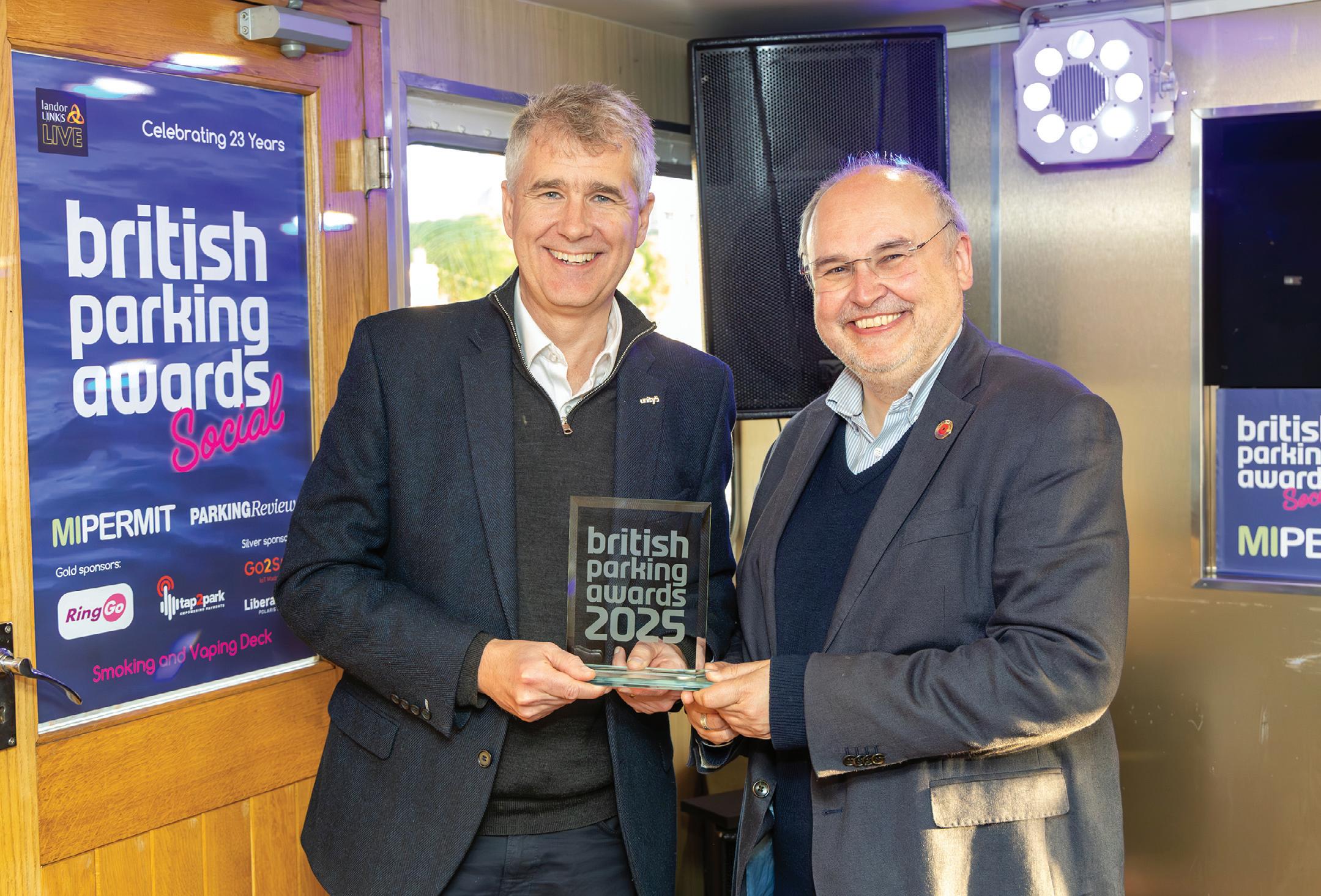




The Parking Person of the Year award is open to all local authorities and private operators, who can nominate an individual working in parking who has consistently made an outstanding contribution to the sector and represents a ‘model of excellence’.
Recipients may be young employees or recent joiners of any age. Local authorities and private operators can nominate an individual parking employee, consultant or contractor who has consistently made an outstanding contribution to their team and the wider parking sector.
The Parking Team of the Year Award recognises the excellent work of both on-street and off-street parking operations. It is open to teams working in both the public and private sectors.
This category is open to public or private sector parking providers. The award recognises car parks that are managed, designed and maintained in a way that makes the start and end of each driver’s journey a pleasant experience.
Recognising imaginative, engaging and informative approaches to communicating with the public and stakeholder organisations through advertising campaigns, websites, social media and publications.
The Back Office Award recognises the excellent work of back office teams working for local authorities, private parking operators, transport consultancies and civil enforcement agencies.
Parking can be a challenging profession. The Front Line Award is dedicated to parking personnel who engage with drivers and the general public as a part of their day-to-day activities.
The Parking Partnerships Award recognises the importance of partnership working in the parking sector. The partnership may involve pairings or groups of local authorities, companies, professional bodies, campaign groups and other stakeholders.
Parking is an essential service and can be a positive contributor to local communities. This award recognises people working within the parking sector who have engaged with and supported their local communities.
The Parking Technology Award recognises advances in the systems used to manage parking. The innovation will be a piece of parking hardware, software or a service that makes the management of parking more efficient and customer-friendly.
The Best New Car Park Award is a site-specific category that recognises outstanding design and construction techniques that turn car parks into landmark structures that are easy to use.
Car parks are open to the elements and subjected to heavy traffic loads. This award recognises projects and approaches that breathe new life into these important structures.
The Traffic Team category recognises the skills and achievements of organisations responsible for implementing traffic and parking schemes such as CPZs, TROs, permit schemes, payment systems, EV charging and a host of other essential services – including planners, engineers, consultants and contractors.
People and organisations making a positive contribution to the world of parking.
The MiPermit Inspiration Award recognises individuals and organisations that have made a significant contribution to improving parking. Inspiration Award recipients are exemplars of excellent practice that have inspired colleagues, clients and the wider parking community.
The Lifetime Achievement Award will be presented to a parking professional who has made an outstanding contribution to the sector over the course of their career. Parking organisations and professionals are invited to nominate an individual who has consistently made an outstanding contribution to the industry and represents a 'model of excellence' across their entire career.
The Special Jury Award is presented to a scheme, project or person that has particularly impressed the British Parking Awards jury, which is a panel of experts drawn from across the parking, automotive, transport and related sectors.
A trio of new trophies.
A forward-looking award that will recognise innovative approaches to the provision of parking. It will pay particular attention to policies, projects and technologies addressing the worlds of: electric vehicles; shared mobility services; harnessing data and AI; and autonomous driving..
The International Parking Award recognises innovative and inspiring work being done by the parking sector across the world. This category is open to UK parking professionals and organisations working internationally and international parking organisations working in the UK.
Wellbeing initiatives create a positive, supportive and inclusive environment where employees can thrive, and feel valued and fulfilled in their roles. The new Wellbeing Award recognises work being done to enhance the physical and mental health experiences of people in the parking sector.

The worlds of parking and electric vehicle charging are connecting. The parking sector is playing a key role in the transition to electric vehicles (EVs), as reflected in the launch of Parking Review's special EVolution section and website.
The EV Charging Award recognises the development of innovative approaches to providing EV charging infrastructure, systems and services in car parks and at the kerbside. The category is open to parking providers, chargepoint operators and technology developers.








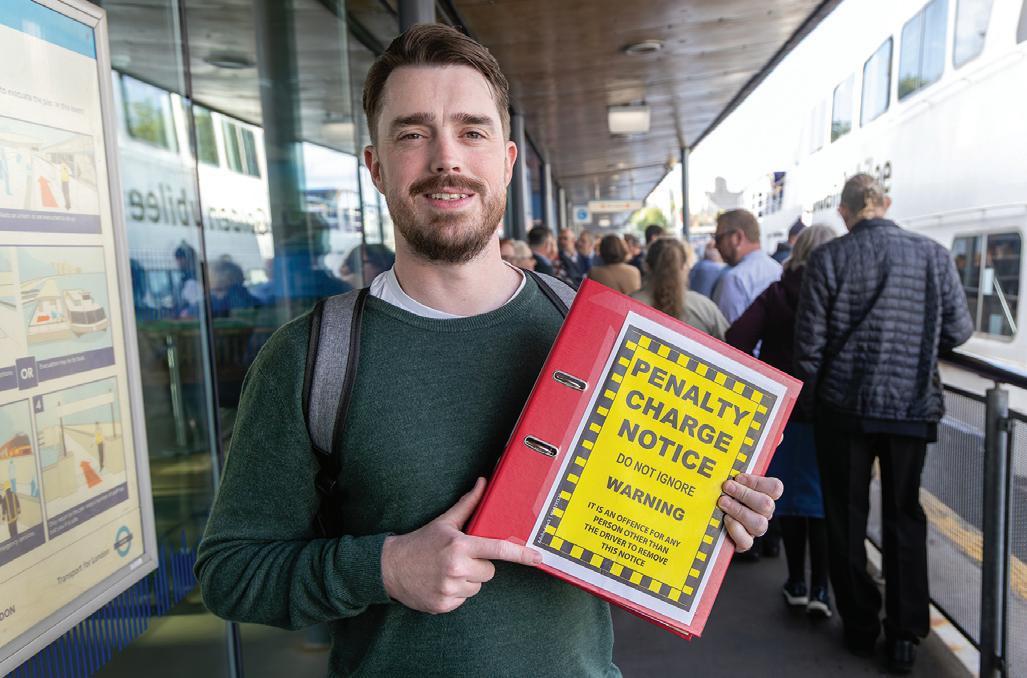
The British Parking Awards 2025 will be presented at the Royal Lancaster London by stand-up comedian and broadcaster Angela Barnes. Since winning Radio 2’s New Comedy Award 2011, she has become a regular on TV and radio. Besides her regular appearances on the BBC’s Mock the Week, Angela has appeared on Live at the Apollo, Have I Got News for You, Richard Osman’s House of Games and Radio 4’s News Quiz. In parallel to her stand-up work she has also made documentaries about the Cold War and co-hosts the We Are History podcast with writer John O’Farrell.




One of the most wellknown and trusted voices on British television, Roger Tilling is now firmly established as the voice of the British Parking Awards.
With over 25 years of television and radio experience, the UK's television networks have made Roger their first port of call when a ‘Voice of God’ delivery is needed for major television events and primetime shows, from The Royal Variety Performance to The British Soap Awards, and Never Mind The Buzzcocks to Top Gear.






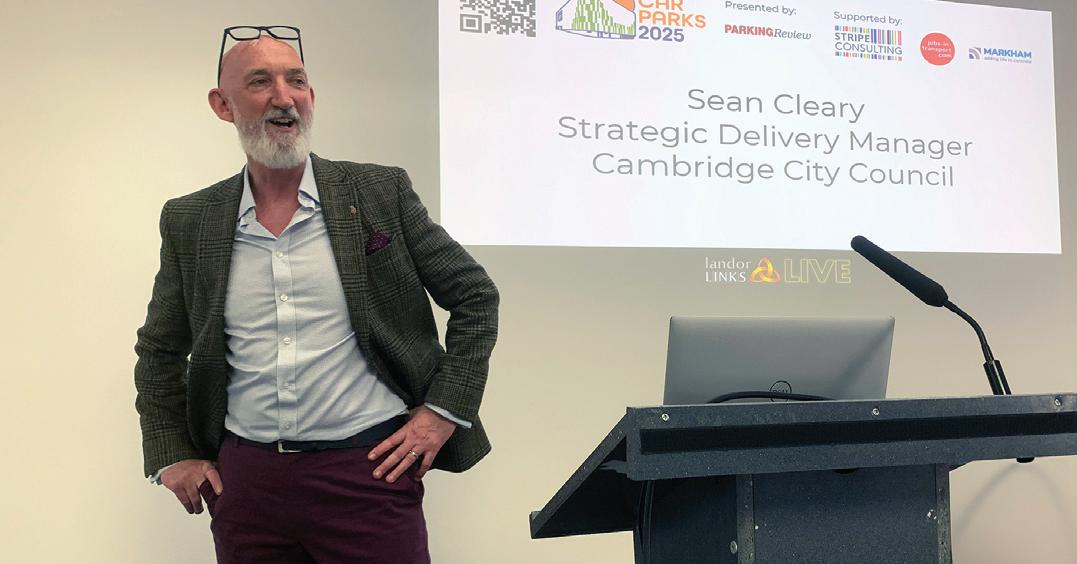
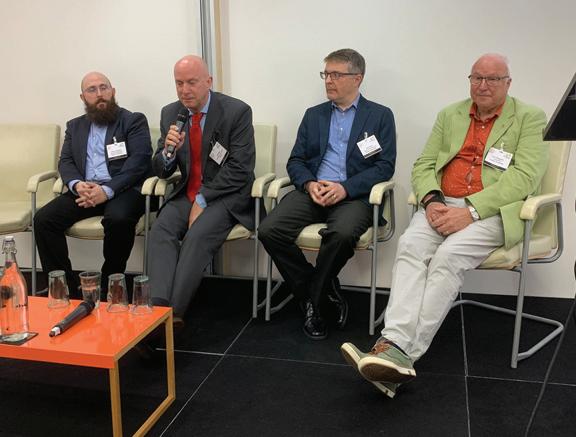


Car parks are important civic structures that open up destinations, support their local economies, and are vital revenue generators in their own right. This is why car parks are worth talking about. Car Parks is an annual conference organised by Landor LINKS and programmed by Parking Review in partnership with the team at Stripe Consulting. Car Parks 2025 showcased new approaches to construction and fitting out structures. This year there was focus on the importance of understanding design standards and harnessing knowledge. Delegates received important information on the behaviour of fire in car parks. There was expert advice on how to design structures that can cope with the increased weight of modern cars. A poignant presentation looked at designing and managing structures in a way that prevents suicide attempts. There were expert insights on implementing electric vehicle charging infrastructure, on renovating ageing car parks and practical advice on how look after these important assets.
A highlight of the day was a special ‘game’ which explored the options for property owners when it comes to deciding whether they refurbish or replace ageing car parks.
To find out how to be a part of Car Parks 2026 contact Jason Conboy, managing director of Landor LINKS, by email on: jason@landor.co.uk
The importance of being informed
Russell Simmons, managing director of Stripe Consulting, encourages the sharing of knowledge
Aday about car parks! Why? Cars provide freedom, enable choice, facilitate jobs and serve markets. Car parks, the way we use them and the way we need them may change, but a node between car, society and our built environments is needed and is important.
So car parks are a big deal. Your ability to make decisions about the future of your car parks, their upkeep and their operation will be improved by having the right information.
Ensure you know all you should know, and if you don’t know what you need to know, speak to someone who knows.
The speakers at an event like Car Parks 2025 all have information that they can talk about with authority. So learn as much as you can and, hopefully, this knowledge will help you, your clients and colleagues to make decisions to benefit us all.




Understanding the risk of structural overload
Car parks are dynamic spaces used by vehicles and pedestrians, whose structures are exposed to dramatic changes in load, the elements, traffic movement and icing salts. The growing size and weight of cars, such as SUVs and electric vehicles, has sparked a debate over whether or not existing multi-storey car parks are at risk of collapse.
“Car parks do collapse for a multitude of reasons, but collapses should be avoidable,” said Chris Whapples, consultant at Stripe
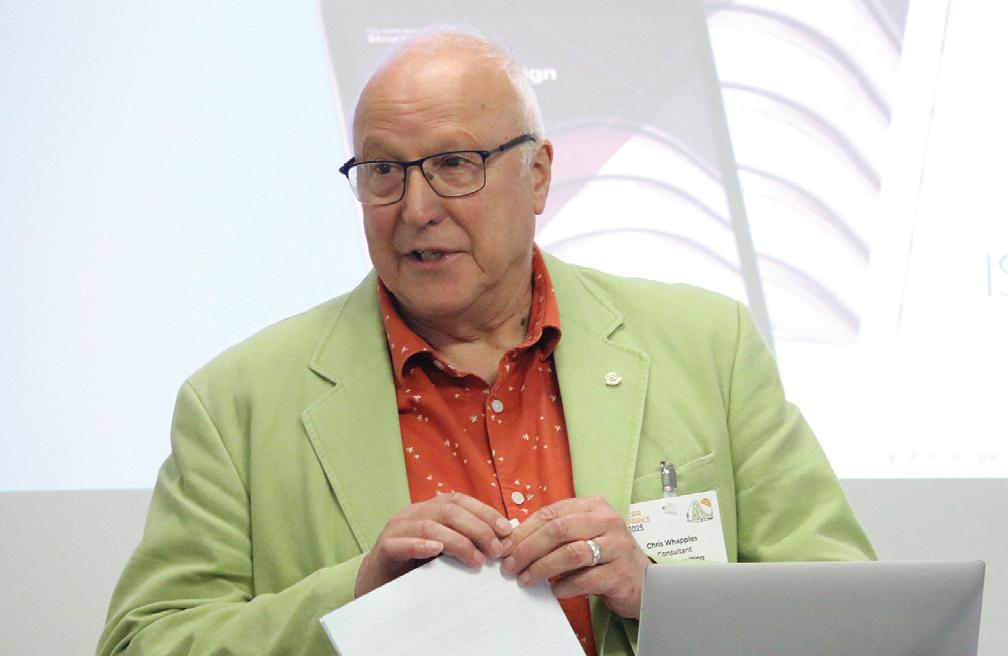

Consulting. Whapples recommends car park operators are vigilant and invest in understanding their structures. “Are there telltale signs that reveal to us that a structure is overloaded? The risk is normally evident from cracking, sagging and elements going out of plumb. But visual evidence alone is insufficient and needs to be supported by the results of thorough structural investigation and assessment.”
Hugo Fernandez, a structural engineer at Stripe, shared insights from assessments of older car parks and offered approaches to mitigate the risk of collapse. “Solutions include strengthening structures, re-arranging bay layout or limiting access by heavier vehicles to the suspended floors,” he said.

Fires in car parks are not uncommon, however the blazes in multi-storeys serving Liverpool Arena in 2017 and London Luton Airport in 2023 were unprecedented in their scale. Both fires resulted in the destruction of hundreds of vehicles and loss of the buildings. These high-profile fires led the influential safety body Collaborative Reporting for Safer Structures (CROSS) to examine the safety of car park facilities in a number of important reports.
Ian Bailey BEng, fire safety consultant at CROSS, draws on his experience as a firefighter to understand how buildings behave in fires, and approaches to prevent or fight blazes.

Ian Bailey shared the insightful work of CROSS
Jon Elliot offered advice for designers and operators
Suicides at car parks are a sadly common event. But they are avoidable and preventable. Multi-storey car parks are open structures, providing easy access to great heights, from which jumping presents a perceived or believed higher certainty of death. Consequently, it’s important to minimise potential risks and work with experts to provide information and access to learning material and training.
Jon Elliott, head of architecture at Stripe Consulting, shared how the British Parking Association’s Structures Group has devised new guidance for organisations that design and manage car parks.
The guidance states that suicide can be prevented. Any risk identified and mitigated may save a life. Car park operators are urged to create a suicide prevention strategy and establish relationships with local police, first responders, crisis intervention professionals and suicide-prevention organisations who can provide advice and training.
A number of steps can be taken to prevent car parks from
Bailey guided delegates through the causes and consequences of the Liverpool, Luton and similar car park fires. He addressed how the design and construction of modern vehicles is adding to the intensity of car park fires. Cars are getting bigger and there are issues around the use of plastic fuel tanks, which melt and accelerate fire spread. There is also a need to study and better understand the way in which electric vehicles behave in a fire, he said.
Bailey also looked at how fires are fought and explored the case for installing sprinklers in car parks.



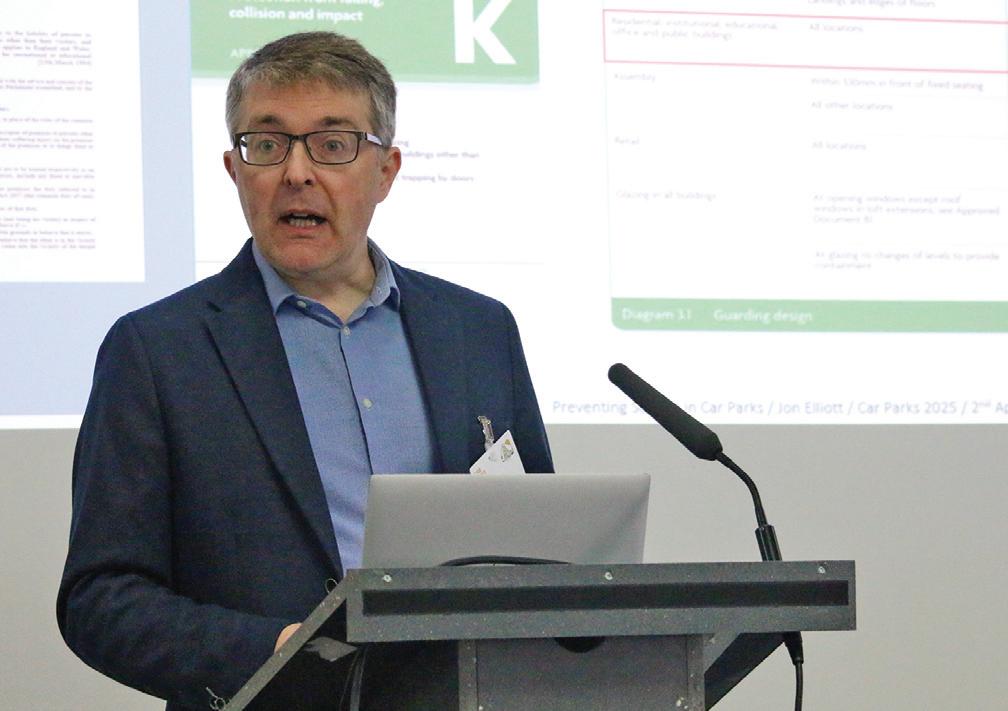

being used and to increase the chances of a last-minute intervention. Many of these resonate with the Safer Parking Scheme and Park Mark award, such as CCTV or foot patrol surveillance, good lighting and a clean environment.



Car parks are structures that need to be looked after to keep them operating efficiently and safely
A panel of experts stressed the importance of regular inspections. maintenance regimes and properly planned renovations.
How to clean a car park
Keeping parking areas spick and span not only creates a nicer ambience for customers, but cleaning regimes that unblock


Cambridge is reinventing its car parks as EV charging and secure cycle hubs, said Sean Cleary
The historic city of Cambridge has been integrating electric vehicle (EV) charging infrastructure into its car parks. In parallel, its car parks also feature facilities that support Cambridge’s long-standing status as a cycle city.
Sean Cleary, strategic delivery manager at Cambridge City Council, set out how the car park works are taking place in the context of Cambridge’s commitment to leading by example in the fight against climate change.
“We’ve set a target for net zero carbon by 2030 for our own operations, and we’re supporting a city-wide goal of net zero by 2050. Transport is one of the biggest contributors to emissions, so investing in sustainable mobility is essential. Our focus on EV charging and cycle hubs helps us: improve air quality; reduce traffic emissions; encourage active travel, such as cycling and walking; and build long-term infrastructure that supports greener, healthier lifestyles. This means, by making it easier for people to switch to electric vehicles and bikes, we’re helping make Cambridge a cleaner, more sustainable city for everyone.”
The city’s EV charging roll-out has been rapid. “In 2023, we started small, with just four EV chargers. By 2024, we had installed 150 chargers, a major step forward. Here in 2025, we’ve reached 200 chargers which shows real momentum.
“If we look at usage data since April 2023: we’ve sold over


drains and remove de-icing salts protect the structural integrity of structures, said John Taylor, consultant at 49 Parks.
Life-care planning for car parks
Harry Smith, senior technical manager at Stripe Consulting set out how a properly planned and recorded regime of checks and inspections ensures that car parks remain structurally sound.
Investigations: Making the invisible visible
Christian Stone, Level 3 corrosion engineer at Concrete Preservation Technologies, set out how targeted corrosion monitoring and investigations allows the early identification of corrosion issues. This enables the planning of works to prevent the deterioration of car park structures.
Protecting concrete structures
Corrosion in concrete structures is often associated with the penetration of water and de-icing salts. Russell Gulley, project consultant at Markham, explained how hydrogel technology can protect parking structures by creating hydrophilic reaction that counteracts the processes that lead to concrete corrosion.
How to plan a refurbishment
Russell Simmons, managing director of Stripe Consulting talked about how the renovations of town centre multi-storey car parks in Colchester and Horsham were planned and implemented.


130,000 kWh of electricity. That’s a lot of clean miles.
“Some 11,000 charging sessions have taken place, with nearly 2,800 unique customers. That’s added up to 442,000 miles driven using electric power instead of petrol or diesel. And most importantly, we’ve saved 119,000 kg of CO2 compared to internal combustion engine vehicles.
“All of this has happened at off-street locations, including car parks integrated into our city infrastructure. It’s a great example of how we’re actively supporting Cambridge’s net zero transition – not with future plans, but with real results happening now.”
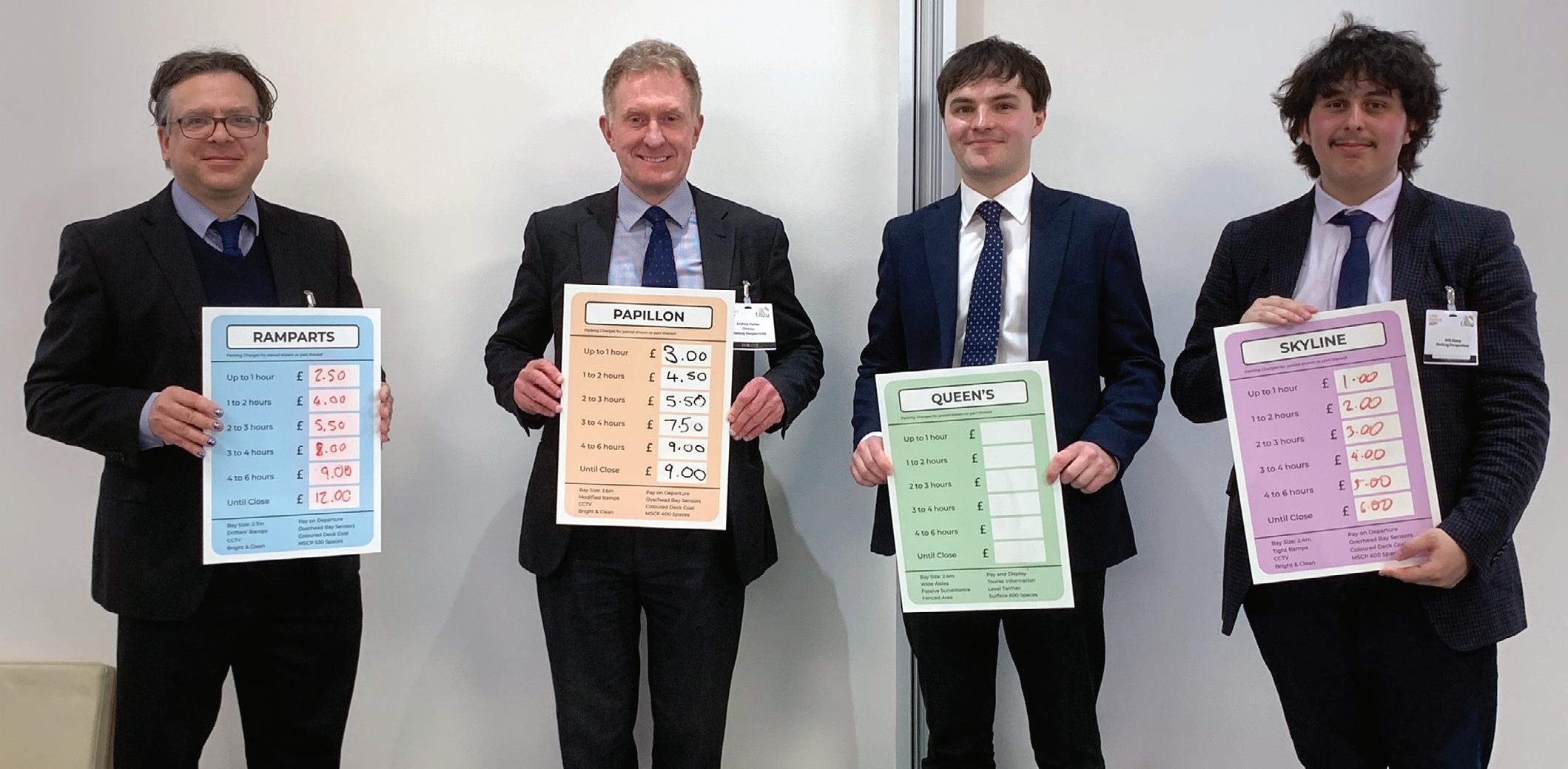

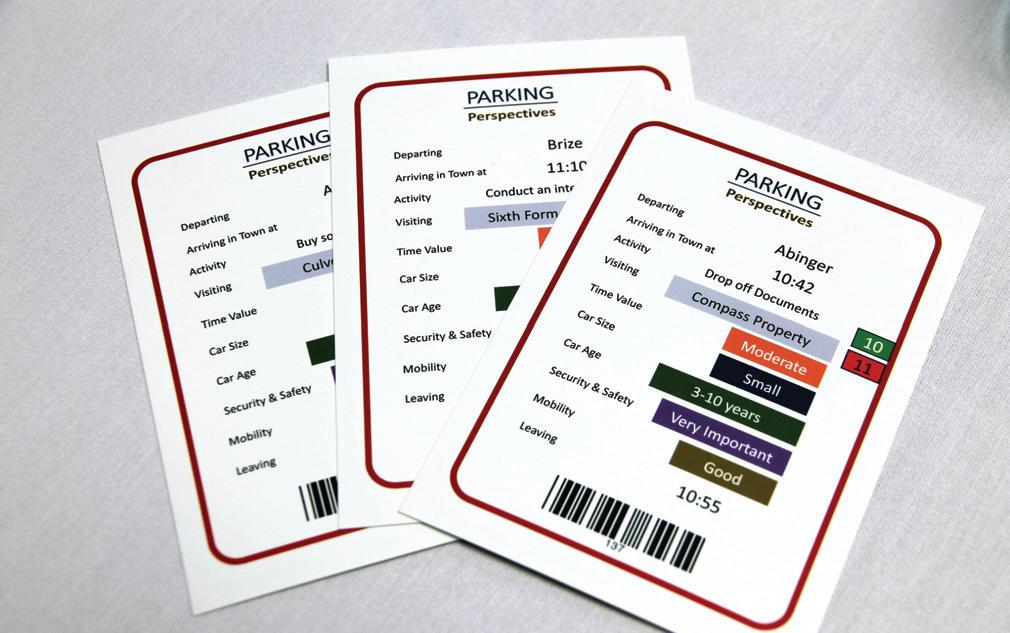

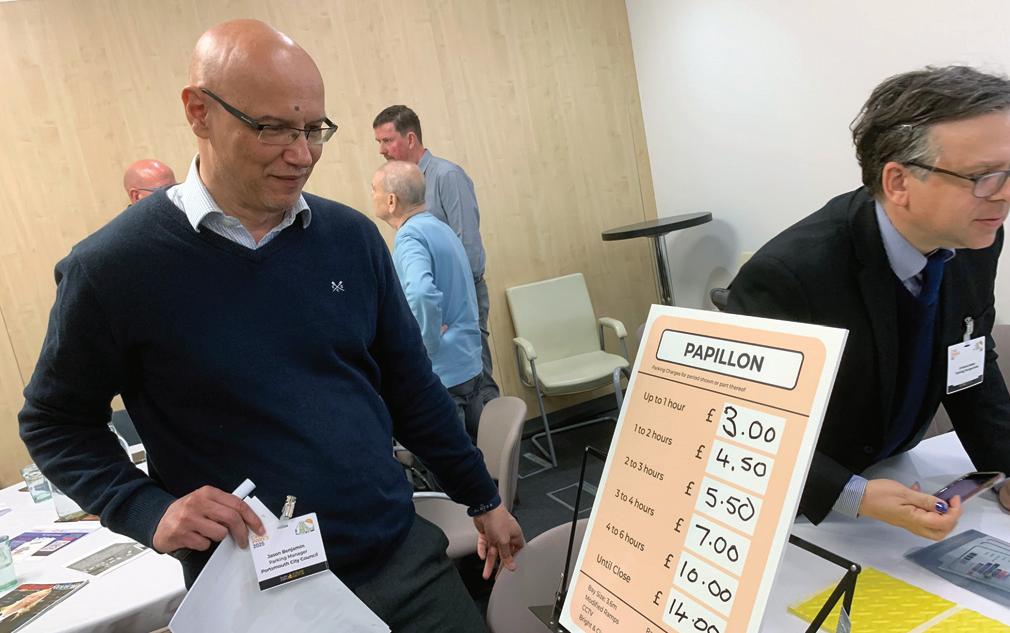

Refurbish, rebuild or replace?
The car parking experience can define a visitor’s first impression of a place, business or institution and set the tone for the rest of their visit. Property developers and operators need to serve the needs of drivers and the destinations they want to visit when creating, upgrading and running car parks.
A growing number of multi-storey car
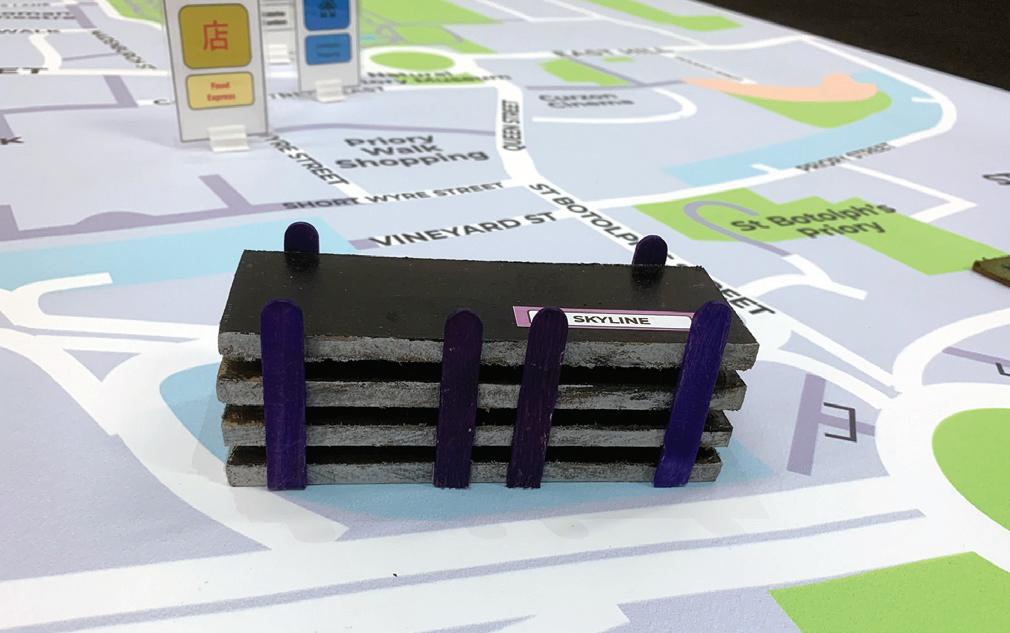



parks built in the 1960s and ‘70s are now showing their age. Not only do many need structural renovation, but also modernisation to cope with a world in which cars are larger and electric.
The question car park owners and operators have to answer is whether or not to refurbish, rebuild or replace?
Does it makes sense to:
• renovate or rebuild ageing parking structures so that they offer a better parking experience in the hope this generates a better return, or...
• leave existing sites as they are, but offer poorer service levels and tolerate lower yields?
Potential answers to these questions were played out in The Car Park Game, an exercise that saw teams of delegates invited to play the roles of car park operators trying to compete for a range of drivers played by fellow attendees.
The game was devised specially for Car Parks 2025 by Andrew Potter, director of Parking Perspectives.
Car park will support regeneration of Yorkshire seaside town
The building of a multi-storey car park in Bridlington has started. Henry Boot Construction has officially broken ground on the Beck Hill car park, which is a key project within the Yorkshire seaside town’s wider regeneration strategy.
Located between Manor Street and Hilderthorpe Road in the town centre, the car park provides 426 spaces, 31 accessible parking bays, six EV charging bays, eight motorcycle bays and 12 cycle spaces.
The car park will be owned and operated by East Riding of Yorkshire Council, which hopes it will boost accessibility and support local businesses. Designed to make it easier for people to visit, shop, and stay in the area, the facility will also help to alleviate pressure on existing town centre parking.
The car park’s architectural design seeks to give the car park a strong visual identity with the building incorporating a wave-


inspired exterior that reflects its coastal setting.
In preparation for construction, Henry Boot Construction is undertaking demolition and civil engineering works, including the diversion of the existing Gypsey Race River, which is key to enabling the project to move forward.
The multi-storey car park forms part of a long-term regeneration strategy for Bridlington, aiming to revitalise the town centre, attract investment, and futureproof local infrastructure.
Lee
Powell, managing director
The creation of a 1,300-space multi-storey will enable the redevelopment of a Norfolk hospital.
The Queen Elizabeth Hospital King’s Lynn NHS Foundation Trust has secured funding for an all-new hospital. Construction is expected to start in 2027-28.
The new hospital will be built on the site of the existing hospital’s main car park, so a new multi-storey car park is being built to make way for the new development.
RG Carter has been awarded
an £18m contract for the new multi-storey car park, which will have 1,310 spaces.
The car park is being built on the site of the hospital’s Inspire Centre, which was demolished in 2023.
The contract award follows confirmation of a government funding envelope of £1bn to £1.5bn for the New Queen Elizabeth Hospital.
The existing hospital needs replacing because the reinforced autoclaved aerated concrete (RAAC) used in its construction is now crumbling.
at Henry Boot Construction, said: “This project is set to be a catalyst for economic, social, and civic growth in Bridlington. By improving access and convenience, the car park will help support local shops and hospitality venues by encouraging more people to spend time and money in the town – making it a more attractive place to live, visit, and do business.
“We’re proud to be delivering a project with such lasting value for the community and to play a meaningful role in supporting the area’s long-term regeneration plans.”
Cllr Anne Handley, leader of East Riding of Yorkshire Council, added: “I am thrilled that work is finally underway on such a vital piece of infrastructure for the town. This investment is a clear signal of our confidence in Bridlington’s future.
“This new multi-storey car park will not only address current parking challenges but also support the town’s regeneration by making it easier for people to visit, shop, and enjoy everything Bridlington has to offer for years to come.”


checks on small areas.

Worthing Borough Council has closed the seafront Grafton multi-storey car park in order to carry out urgent investigations into its condition. The car park, off Marine Parade, is more than 60 years old and has required heavy investment in repairs and maintenance in recent years to keep it open and safe.

The council carries out full structural surveys of the car park every six months so that it can monitor the effect of the elements on its frame. More frequent visual inspections are also done, as well as strength
“Unfortunately the age of the building combined with its location means some of the concrete inside the car park is failing,” the council said. “Recent inspections have revealed that some sections of concrete are in a poorer condition than expected. For that reason, we need to carry out urgent investigation work and review the findings to determine how best to ensure that Grafton is safe to use.
“Public safety is our priority so we have immediately closed the whole car park.”


Manchester’s Ancoats Mobility Hub is more than a car park, it is a green transport facility
Amobility hub providing the residents of a new neighbourhood with access to a range of travel options is a key element of the £40m Ancoats development in Manchester.
The housing scheme is expected to complete this summer and will offer 128 apartments, 30% of which will be capped at the Manchester Living Rent. Homes England has committed £28.1m to the overall project.
Opened on 6 May, the Ancoats Mobility Hub has over 400 parking spaces, but is more than just a car park. It features over 100 electric vehicle chargepoints, car club bays, 150 Spokesafe secure bike parking spaces and changing facilities. There are also parcel lockers and space for a retail unit.
The mobility hub centralises parking, cycle storage and last mile deliveries for the residential development, reducing the number of vehicles in the local area will help improve air quality for residents and visitors.
The Ancoats Mobility Hub was designed by Buttress Architects.
The mobility hub was built using low carbon construction techniques. It incorporates hundreds of photovoltaic panels on its roof and living green walls, supporting Manchester’s target to become a zero carbon city by 2038.
The green wall scales the entire height of the eight storey building, with plants carefully chosen for their pollution-absorption, urban tolerance and year-round flowering. It is estimated that each square metre of wall
planting can extract 2.3kg of carbon dioxide and produce 1.7kg of oxygen, while also filtering dangerous toxins and microparticles.
The Ancoats development supports the principles of a low traffic neighbourhood. The design of public realm across the development seeks to foster connections with adjoining neighbourhoods.
For example, the mobility hub backs on to Ancoats Green, which has been replanted and landscaped. The new-look Ancoats Green includes walking and cycling routes to encourage active travel.
Bev Craig, leader of the council, said: “The Ancoats Mobility Hub is a central piece of neighbourhood infrastructure that will help to put people at the heart of this community, rather than car traffic. Rather than being a car park or cycle store, las- mile delivery hub and new commercial space, this development is a blueprint for how we can create cleaner, greener communities – with few cars and more space for people to enjoy their space in a more peaceful, safer setting.”
The hub’s pre-booked and on-the-day parking will be managed by APCOA. The parking operator will also manage payment for charging at one of the 102 electric vehicle charging points.
Kim Challis, APCOA regional managing director UK&I, said: “We are proud to manage this prestigious site in partnership with Manchester City Council. Our proven track record with the design and build of APCOA Urban Hubs in Carmarthenshire, Manchester
and Sheffield strengthened our offering, and we are delighted that the outstanding sustainability credentials of the new Ancoats Hub align closely with our own commitment to the environment.
“We look forward to being an integral part of this unique investment and to collaborating with the council to incorporate feedback from residents and businesses as the hub becomes an essential part of local life.”
• 150 secure bike parking spaces and changing facilities
• 102 electric vehicle charging points, with potential for more
• Spaces for car club and car share schemes
• 406 car parking spaces for residents and visitors
• Over 400sqm of green wall
• 400 rooftop solar panels
• Ground floor space for new wellbeing activities.
• Over 1,300sqm of new public realm, connected to Ancoats Green and the nearby canal and New Islington
• A parcel locker hub to centralise how local people can receive post and packages, helping to reduce delivery traffic in the area
• A commercial unit is currently in the process of being marketed.

Lilian Greenwood
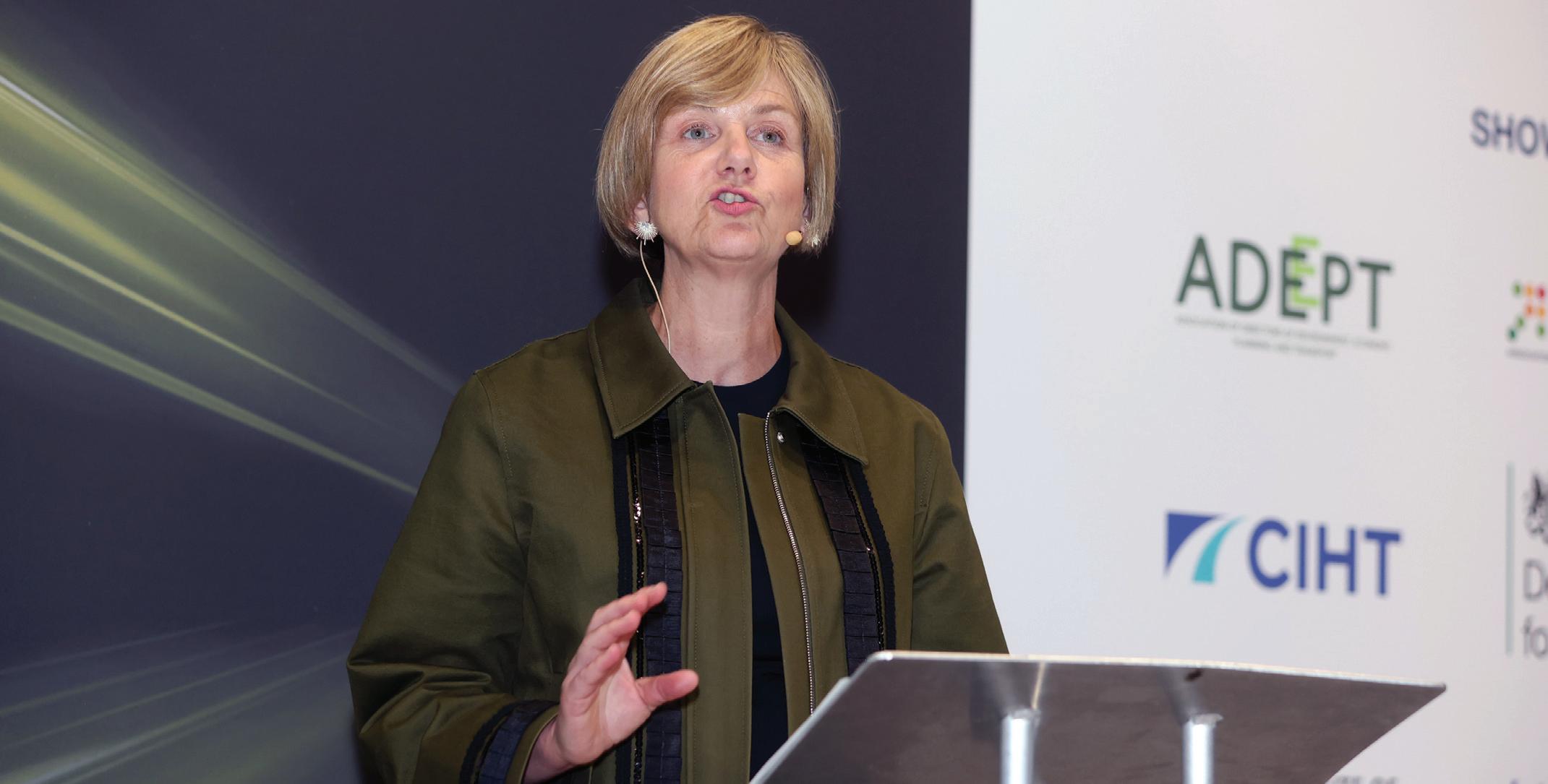
Transport minister Lilian Greenwood predicts that parking will become smarter, fairer and more accessible
Parking was at the heart of a speech delivered at the Parkex and Traffex trade show in Coventry by transport minister Lilian Greenwood. She used the show as the stage on which to announce that the Department for Transport will transfer the National Parking Platform (NPP) to an independent not-forprofit organisation led by the British Parking Association. Greenwood called the NPP a “revolutionary national digital infrastructure” designed to simplify parking for drivers and provide local authorities with more flexibility.
Additionally, the future of roads minister outlined how Digital Traffic Regulation Orders (D-TROs) will transform management of roads, enhancing data accessibility and improving network management. Greenwood said the government also plans to address pavement parking and empower local authorities to enforce safety-critical traffic orders, with 73 local authorities already adopting these powers. Greenwood also pledged to:
• Publish a formal response to the 2020 pavement parking consultation and announce next steps for pavement parking policy.
• Open the fourth application window for local authorities to take up powers to enforce safety-critical moving traffic offences, with a deadline of 7 July.
• Continue rolling out lane rental schemes and publish updated guidance to support local authorities in getting them right.
The National Parking Platform (NPP) is a digital infrastructure developed to simplify parking and improve local authority control over data, pricing and policy. The NPP aims to create a fairer, more open system for app providers, reducing the need for multiple apps and improving user experiences. The platform allows local authorities to connect to a shared system, enabling drivers to pay using any approved app provider, and giving councils control over data, pricing, and policy goals.
“I’d like to talk about something that is quietly revolutionary,
the National Parking Platform, or NPP, she said. It’s a prime example of how public investment, working in partnership with local authorities and industry, can make life easier for people.
“The NPP isn’t another app. It’s a piece of national digital infrastructure developed to simplify parking for drivers, give local authorities more flexibility and create a fairer, more open system for app providers. Now, let’s be honest, we shouldn’t need a PhD or a million different apps to park the car but drivers face inconsistent rules and clunky user experiences. On top of that, councils are left managing costly, fragmented systems with little opportunity to shape the situation in their communities.
Let’s be honest, we shouldn’t need a PhD or a million different apps to park the car
Lilian Greenwood
“The NPP fixes this. It allows local authorities to connect to a shared platform through which drivers can pay using any approved app provider. It puts choice back in the hands of the user. It allows councils to retain control over their data pricing and policy goals, and it creates better and fairer market competition based on service quality at the point of sale.”
Trials that have been running in Manchester since 2021 have demonstrated the NPP’s potential to enhance competition, improve user experiences, and deliver better value for the public, Greenwood said. “The results were clear, one neutral platform could enhance competition, improve the user experience and deliver better value for the public.”
The NPP is now live with 10 local authorities, handling over half a million parking transactions monthly, making life easier for drivers and offering councils a clearer picture of local transport usage. Greenwood said: “It’s already making life easier for drivers
and offering councils a clearer, more coordinated picture of how their local transport systems are used. But this platform has the potential to be about more than parking.”
The platform has the potential to support smarter, more sustainable mobility, including traffic management, clean air strategies, EV charging, and digitised traffic regulation orders.
The Department for Transport believes transfering the NPP to a not-for-profit organisation led by the British Parking Association, will ensure transparency and fairness for all stakeholders. “It’s a partnership model done right,” she said. “Public infrastructure, transparently run and shaped by the people who know the sector, and a platform that will work for everyone, not just the biggest providers, but for local businesses, councils and communities alike, with the NPP charging only what’s needed to run and develop the service,” said Greenwood. “It’s fantastic that we’re now ready to scale this technology around the country. I’m proud that we can deliver on this government’s plan to make roads better, journeys simpler and lives easier. Of course, there’s no one silver bullet, but we are ready to step up and prove that smart technologies can improve our roads for good.”
The NPP will charge only what’s needed to run and develop the service, with plans to scale the technology nationally. Greenwood predicted the NPP would bring greater choice for drivers and provide a more resilience to the provision of parking. “Lower barriers to new entries will mean there’s plenty of choice,” she said. “There’s a more resilient system so that if one app goes down, you can use another and the opportunity for specialist apps to ensure protected groups and disabled users get the service that they deserve to now.”
Lilian Greenwood set out Department for Transport thinking on a range of traffic and parking themes
In an address at Parkex 2025 that covered parking issues, moving traffic regulation and micromobility schemes, future of roads minister Lilian Greenwood expressed a desire to continue working constructively with stakeholders. She emphasised the importance of smart technologies in improving roads and journeys, and the government’s commitment to delivering simpler journeys.
Greenwood acknowledged the problems caused by pavement parking, especially for pedestrians with mobility or sight impairments. “I recognise that pavement parking can cause serious problems for all pedestrians, and especially people with mobility or sight impairments, children and parents,” she said.”We intend to publish a formal response to the 2020 consultation, one that will summarise the views received and announce our next steps for pavement parking policy. That’s coming later this year.”
The government has empowered councils outside London to enforce safety-critical traffic orders since 2022, with 73 local authorities taking up these powers. These powers have led to tangible benefits, including improved air quality, active travel promotion, better bus punctuality, and increased pedestrian safety. Greenwood said: “We know that these powers are already having a positive impact. More people are following the rules. That’s what we want. Derby City Council told us, for example, that between 50 and 72% reductions at five out of six School Street schemes after only six weeks.”

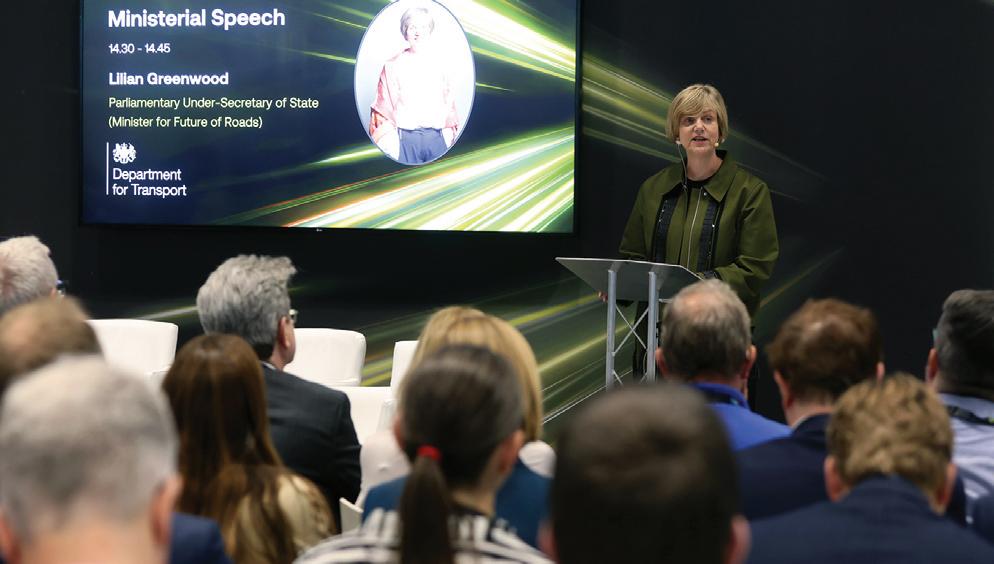
Future of roads minister Lilian Greenwood said a central Digital Traffic Order service will allow authorities to send traffic orders into a central platform, making traffic information more accessible and up-to-date. The service will soon enter the public beta stage, with over 12,000 traffic orders from 15 different local authorities already in the system.
Digital traffic orders (D-TROs) will enable an England-wide data set, improving traffic management, reducing emissions, and enhancing the efficiency of delivery trucks and automated vehicles. Highway authorities, traffic control centres, and transport planning apps will combine D-TRO data with other open data sets to inform and improve network management and planning decisions.
Speaking at Parkex, Greenwood said: “Making traffic orders digital will allow delivery trucks to book a loading bay rather than circling the block waiting for a space to become available, feeding information about speed limits and road closures into automated vehicles, helping reduce emissions, and feeding into parking apps providing information about the placement and restriction times of parking bays across the country.
“The benefits are huge. Highway authorities, traffic control centres and transport planning apps will be able to combine Department for Transport data sources like D-TROs, Street Manager, roadworks, information and bus open data with other open datasets to inform and improve their network management and planning decisions. Incremental steps like this, when taken together, can add up to huge benefits for all road users.”
The future of roads minister addressed the regulation and enforcement of moving traffic. She told delegates: “We’re making great progress in our commitment to give councils outside London the powers to simply enforce safety critical contributions. Since 2022 some 73 local authorities, more than two-thirds of you, have taken up these powers, and that brings tangible benefits. It will improve air quality through reduced congestion, promote active travel by keeping vehicles out of cycle lanes, improve bus punctuality by freeing up junctions and improve safety for pedestrians crossing the road by enforcing ban turns and no entry restrictions.
“The early signs are very encouraging and, hopefully, inspiring. The fourth application window is open now. If your local authority is keen to take these powers, I encourage you to apply either this time or in a future tranche.”
Greenwood discussed the government’s efforts to integrate micromobility vehicles like dockless bikes into the transport network, empowering local leaders to make decisions for their communities. The government is committed to increasing bike share across the country while balancing restrictions to avoid issues like pavement blocking, said Greenwood.
“The uptake in these vehicles has been enormous, and the government is working to make sure they’re integrated properly and sensibly in the networks of the future,” she said. “Local leaders are best placed to make decisions for their communities, especially around issues with dockless bikes blocking pavement, so we will keep empowering your decision making at the local level, as we believe that’s the right thing to do, balancing restrictions with our aim to increase bike share across the country.”
To manage street works more effectively, the government is rolling out Lane Rental schemes, allowing local authorities to charge utility companies for work on busy roads, with at least 50% of surplus funds invested back into road maintenance and pothole repairs. Updated guidance has been published to support local authorities in implementing Lane Rental schemes effectively, ensuring strong infrastructure and smooth traffic flow.

The latest parking systems and services were on show at Parkex 2025
Parking professionals from around the globe gathered at the British Parking Association’s Parkex 2025 event. The trade show was held at the CBS Arena in Coventry during May. The annual show runs in parallel to Traffex, with both events providing a showcase for system and service providers in the highways sector.
The highlight of the conference programme was a well-attended speech by future of roads minister Lilian Greenwood who announced that the National Parking Platform would be run by a new consortium supported by the British Parking Association.
The exhibition halls hosted a series of ‘live theatre’ seminars discussing issues such as digital parking technology, accessibility, staff welfare and parking on private land. The central role of the parking sector in providing electric vehicle infrastructure was evident in both the number of chargepoint providers exhibiting and the discussions that took place in the EV Connect strand.
The Parkex and Traffex 2026 shows will take place at the CBS Arena in Coventry on 20-21 May www.parkex.net

The British Parking Association honoured the late John Heasman, a former president of the organisation, with the presentation of awards recognising technology innovation, best practice in parking structures and sustainable thinking.
Parking Technology Innovation Award
Winner Trellint
KERBSight
An enforcement platform that uses real-time data and ANPR tech to boost urban parking compliance. It has been trialled in Oxford, where it increased output and reduced emissions via the use of electric mopeds.
Finalists
• Parkingeye
• RTA Associates
Zero Emissions Innovation Award
Winner: Parkingeye
Evology Access & Charging
Parkingeye is using ANPR to support EV charging and protect priority bays for Blue Badge holders and parents with children. The system features ‘tap & go’ payments and live monitoring.
Finalists
• Pair Parking
• Cambridge City Council
Parking Structures Innovation Award
Winner: Stripe Consulting
Blackpool Central MSCP
The Stripe Consulting team combined modern design with historical sensitivity when designing a multi-storey car park near Blackpool Tower. It provides 1,306 spaces and supports sustainable transport with EV charging. Built using modular construction, the car park meets high fire safety standards and is designed to adapt to future mobility needs.








ANPR enforcement for rural and coastal car parks
VREO Innovations, a developer of camera-based parking enforcement technology, has launched Solaero, a fully offgrid ANPR system powered by solar and wind energy.
The company has created Solaero for countryside, coastal, and rural parking areas where mains connections can be difficult to provide.
VREO’s system offers ANPR enforcement with no need for a mains connection while cloud connectivity enables remote monitoring.
VREO developed the solution for locations that:
• are off-grid or have weak grid connections
• experience seasonal use patterns (e.g. coastal or countryside destinations)
• lack the infrastructure to deploy traditional ANPR or enforcement systems.
The Solaero camera system features global shutter and adaptive
VREO Innovations’ Solaero system


infra-red (IR) for superior plate capture. One camera offers coverage of three to 50 metres.
VREO has welcomed the UK government’s call for evidence

Debt resolution agency DCBL has launched an app designed to enable people with debts better manage their finances.
The app gives customers full visibility of their debts and allows users to manage their finances more effectively, while also giving them direct access to its customer support team.
DCBL’s in-house technology team has built the app based
on the company’s understanding of customers and insights from the debt recovery sector.
The proprietary app features an interactive dashboard that allows users to view outstanding payments, access, and link past cases, view corresponding evidence, make payments, update their personal details, and contact
for Energy Security and Net Zero, the consultation seeks input on how solar and EV charging can be integrated into both urban and remote car parks. VREO believes this signals a shift in how car parks can serve as energy-producing, environmentally responsible hubs.
“We’re delighted to see national leadership recognising the untapped potential in car park estates,” said Karen Weech, commercial director at VREO. “This aligns perfectly with our mission to build smarter, greener, off-grid solutions for mobility and enforcement. This marks a pivotal moment for car park owners, infrastructure providers and local authorities alike.
“Surface car parks are an ideal, yet underexploited, location for renewable energy deployment. Adding solar canopies or integrated microgeneration systems turns passive tarmac into productive infrastructure.
on Solar on Car Parks and Electric Vehicle Charging as an opportunity to unlock sustainable infrastructure. Launched by the Department
the DCBL customer support team for further assistance.
The app is available on the App Store and Google Play.
DCBL group strategy director Lee Samuels-Camozzi said: “We’re on a mission to take the stress out of debt. Providing support and peace of mind to our customers is paramount. Our new app gives users the ability to easily access and manage their finances, around the clock, which has direct benefits to their mental health and wellbeing.
“By listening to our customers, and conducting extensive consumer research, we have created a bespoke app which gives people the power to manage their finances and personal information in their own time. They are also able to ask questions and seek further support around their existing commitments and busy lifestyles.
“The app has been designed to help take the stress out of debt and support customers when they need it most. It accommodates every type of user preference, with customer support available via phone
“When combined with EV charging, surveillance, and smart traffic management, this creates a powerful ecosystem that supports cleaner travel, better data, and local energy resilience.”
call, email, or WhatsApp. Our specialist vulnerability & welfare team can also be contacted through the app to provide help and guidance for anyone feeling the pressures of debt.”
DCBL has expanded its communications and payment channels, recognising that a growing number of people prefer digital and self-serve options.
The app addresses issues flagged in DCBL research of 2,000 UK adults that showed that the vast majority (93%) of people feel more in control of their finances when there was a mobile app available.
The benefits of this technology span all age groups, with 86% of 25-34year-olds saying apps can increase their ability to pay bills on time, whilst 84% of those aged 65 and over said digital technology helps them feel in control of their money. Off the back of these findings, DCBL has designed its app to support all ages, income levels and backgrounds, as well as maintaining its existing communications channels.
Metric Micro terminals offer card and cash payment options
New parking payment machines are being installed across Reading as part of an upgrade of on-street parking facilities. While it offers the RingGo phone app as a payment option, Reading Borough Council sees a value in offering drivers the option of physical terminals.
All 96 new machines will allow contactless payment by bank cards and mobile payment app. The cashless models will be ticketless, supporting the council’s aim to cut its carbon footprint, and meaning motorists will not need to return to their car to display a ticket.
Eighty-two of the new machines will be used for onstreet parking with the remainder in council car parks. All the new units will be solar-powered.
Most of the machines will be card-only Metric Micro units, but Reading is offering cash payments as an option in about 20

of the on-street machines in locations where there has historically been high cash use, such as around the Royal Berkshire Hospital.
The new equipment, supplied by Metric, will replace old ticket machines which had reached the end of their useful life.
Many of the 168 old machines had been covered in preparation for the upgrade.
Motorists will need to ensure they correctly enter their car
Cycle lanes are designed to be safe and easy routes for people to move around towns and cities, so parked vehicles, even if they are only there for a short time, are particularly hazardous and pose safety risks to cyclists.
Reducing illegal parking supports active travel and improves safety for cyclists, and pedestrians. With this in mind, Yunex Traffic has launched a camera-based enforcement solution designed to make cycle lanes safer and more accessible by identifying obstructively parked vehicles.
The solution employs the Yunex Traffic LaneWatch automatic number plate recognition (ANPR) technology to enforce mandatory cycle lanes.
LaneWatch cameras can be deployed to enforce the entire cycle lane, or specific sections which have been identified as problem areas. With this new application each camera is configured to capture the license plates and details of vehicles that enter and park in the lane in contravention of a solid line which delineates the cycle lane and the double yellow lines within it.
Sharon Silcock, global head of sales (enforcement), said: “With
many local authorities encouraging and investing in active and sustainable modes of travel, it is vital that people are assured of their safety and reliability.
“Our LaneWatch solution helps keep cities safe and attractive for everyone to move around in and we are pleased to now be installing our first cycle lane enforcement solution in a major UK city. The scheme will play an important role in keeping cycle lanes flowing freely and reducing accidents, as well as encouraging behavioural change and a shift from driving to active travel.
“Authorities that have introduced mandatory cycle lanes have found that certain sections of the route can be particularly prone to motorists parking in contravention of the regulations, with couriers and food delivery services often particularly problematic.
“As well as providing a deterrent to those who contravene parking regulations, over time enforcement solutions have proven to change behaviour, encouraging drivers to better plan their journeys and not park illegally.”
registration number when paying to park as no ticket will be issued and parking enforcement officers will check a vehicle’s payment status digitally on their handheld device, or by using automatic number plate recognition (ANPR).
A review of Reading’s on-street parking service found that many ticket machines had a low number of cash transactions and a majority of payments were through RingGo.
Using RingGo incurs a 20p fee, but the app allows motorists to extend their parking session remotely and set reminders when a session is coming to an end. Payment can also be made by calling RingGo, so a smartphone is not required.
John Ennis, lead councillor for climate strategy and transport, said: “The new pay & display machines now being installed around the town will allow motorists to pay for parking using bank card or mobile payment apps for the first time ever in Reading. While the new methods of payment will be welcomed by many, we recognise that cash payment remains popular in some areas of the town and machines will still accept cash in these locations.”
A new on-street parking webpage features a map showing locations of ticket machines and payment options.
The council said it will continue to monitor the new arrangements and will respond to any local demands or issues, subject to available budgets.


Ashift from internal combustion engine to electric vehicles alongside the continued decarbonisation of the electricity system should enable the UK to meet its target to reduce emissions by 68% (on 1990 levels) by 2030, states the Climate Change Committee (CCC) in a new report. The CCC is an independent statutory body that advises the government on emissions targets and reports to Parliament on progress made in reducing greenhouse gas emissions.
The target is the UK’s Nationally Determined Contribution (NDC) as set out in the Paris Agreement, as the first step towards achieving net zero by 2050. “This target is within reach, provided the government stays the course,” says the CCC in Progress in reducing emissions – 2025 Report to Parliament
Emissions relating to surface transport have gone down for the second year in a row, the committee observes. “With the number of electric cars on the road doubling roughly every two years, we expect to see rapid further progress. Increasingly, manufacturers are bringing new, lower-cost electric vehicles (EVs) onto the market, such as the Renault 5, Vauxhall Frontera, and Fiat Grande Panda. Price parity with petrol cars has already been reached in parts of the second-hand market.”
While, on average, new EVs remain more expensive to buy than a comparable ICE vehicle, their price premium fell from 37% in 2023 to 24% in 2024. CCC expects that this trend will continue, resulting in price parity being met between 2026 and 2028.
The CCC estimates that 61% of the drop in emissions needed to hit the 2030 NDC is covered by “either credible plans or has some associated risks, mostly in the electricity supply and surface transport sectors”.
For the remaining 39%, there are “either significant risks, or
insufficient or unquantified plans”, according to the report.
Before the COVID-19 pandemic, there were many years of traffic growth, and a shift towards the use of larger vehicles like SUVs, which meant that emissions from surface transport increased despite efficiency improvements in vehicles, the CCC notes. But, overall, emissions from surface transport are now 16% lower than in 2008, the analysis found.
“The uptake of electric cars is having a measurable and rapidly growing effect on emissions. This has more than offset growing car-kilometres, leading car emissions to fall slightly in the past year. The emissions saving from electric cars has been rising rapidly over recent years, with a compound annual growth rate of 48% since 2022. Approximately half of emissions savings in 2024 were due to new vehicles registered in the previous two years,” writes the CCC.
The year-to-year impact of electric cars is still relatively small, with annual savings in 2024 equating to only 3% of total emissions in the transport sector. “However, continuation of the exponential trend observed over recent years should see this technology emerge as one of the biggest sources of emissions reductions by the end of the decade,” the CCC says.
The EV market for vans has not grown as quickly as it has done for cars, with the 2024 market share remaining similar to 2023 at 6.3%, the report notes. “Early 2025 data is more promising, with sales in the first quarter increasing to 8.3% of the market.”
Nonetheless, sales remain below the UK’s zero-emission vehicle (ZEV) Mandate of 10% for 2024 and 16% for 2025. “In our Balanced Pathway we assume that by 2030, electric vans reach 100% of new sales, compared to the 70% ZEV Mandate target.”
Many of the UK’s biggest fleet operators are considerably ahead of the market-wide average in EV uptake, the CCC reports. “This
includes DPD, who recently reached one-third of their fleet being electric, and Royal Mail, who have a fleet of over 6,000 EVs – the UK’s largest EV fleet.
“Vehicles in these types of operation are typically driven further than the average van, and on journeys that are more stop-start in nature. Therefore, these EVs are likely delivering disproportionately high emissions savings.”
The number of public chargepoints across the UK increased by nearly 40% to over 70,000 in 2024. This growth is ahead of the rate required to meet the government’s target of 300,000 by 2030, the report says.
However, the distribution of charging devices is uneven, with London having more than double the number of chargers per capita compared with any other region of the UK, and with Northern Ireland “significantly underserved”.
Rural locations are also underserved but have higher potential for off-street parking.
Around 65% of households in Great Britain have the potential for off-street parking, says the report. The CCC welcomed the new government’s decision to re-instate the 2030 phase-out date for new petrol and diesel cars, after the previous government had extended the deadline to 2035. “It does so alongside the zeroemission vehicle (ZEV) mandate, which has so far worked effectively to support rapid growth in electric car sales and the charging network. For the transition to accelerate, further reductions in the cost of purchasing EVs, as well as improved access to, and reduced costs of, local public charging, are needed.”
There is hardly any reference to public transport and active travel in the report. However, the CCC does welcome government funding and additional powers for councils to improve public transport and active travel.
“This includes City Region Sustainable Transport Settlements, support for bus services and extending the national bus fare cap (albeit increased from £2 to £3 which may reduce the affordability for some users). Government has also committed £300m into walking and cycling infrastructure in England.” www.theccc.org.uk
The Climate Change Committee (CCC) is an independent, statutory body established under the Climate Change Act 2008. Its purpose is to advise the UK and devolved governments on emissions targets and to report to Parliament on progress made in reducing greenhouse gas emissions and preparing for and adapting to the impacts of climate change.
The Climate Change Act formalised the UK’s approach to tackling climate change – both on mitigation (reducing emissions) and adaptation (increasing resilience to climate change). It established the Climate Change Committee to ensure that the assessment of progress and advice provided can be evidence-based, independently assessed and long term in its advice. Under the Climate Change Act 2008, the committee is required to produce statutory reports to government and Parliament. The key reports are:
• advice on carbon budgets and long-term emissions targets
• progress reports on meeting carbon budgets and targets
• an assessment of UK climate change risks
• progress reports on adapting and preparing for climate change.
In addition, ministers can request CCC advice on specific issues and topics. The committee’s conclusions, analysis, and underlying data are all available in the publications section of their website. CCC recommendations are frequently referenced in the Northern Ireland, Scotland, UK, and Welsh parliaments and assemblies. They are also commonly a source of information for business and industry, academia, the national and international media and, increasingly, the public.
Climate Change Committee members are appointed by the Department for Energy Security and Net Zero, with Adaptation Committee members appointed by the Department for Environment, Food and Rural Affairs.
Climate Change Committee publishes first report card on Labour’s progress on reducing emissions


The Climate Change Committee (CCC) has released its first assessment of the new Labour government’s progress on reducing emissions. Striking an optimistic note, the independent statutory body found that government policies to reduce emissions have improved since last year.
Professor Piers Forster, interim chair of the CCC: “The UK can be proud of our progress in reducing emissions. We’ve cut them by over 50% since 1990. Our country is among a leading group of economies demonstrating a commitment to decarbonise society. This is to be celebrated: delivering deep emissions reduction is the only way to slow global warming. However, the government needs to do more to ensure people see the benefits of climate action in their bills. Given increasingly unstable geopolitics, it is also important to get off unreliable fossil fuels and onto homegrown, renewable energy as quickly as possible. The fossil fuel era is over –cheap, clean electricity is our future.
“Making electricity cheaper will help people feel the benefits of the transition and speed up the uptake of clean electric technologies, such as heat pumps and electric vehicles. There has been positive delivery on key areas this year, including new car electric vehicle market share (19.6% in 2024), heat pump installations (up 56%), and woodland creation (up 59%). Much of this progress is due to previous policy, set out under the previous government. But this government has also made bold policy decisions this year – notably on removing planning barriers on renewable deployment, clarity on the clean power mission, and the reinstatement of the 2030 phase-out date for new petrol and diesel vehicles. But more action is needed. Despite encouraging trends, electric vehicle and heat pump roll-out remain slightly below what is needed and the tree planting rate from last year may not be sustained without further support. Action must accelerate.
“Over the last year, the UK has made progress on reducing emissions. Emissions fell 2.5% in 2024, the tenth consecutive year of sustained reduction in emissions, excluding the COVID-19 pandemic years 2020 and 2021. The UK’s emissions have halved (50.4%) since 1990. With more action, the UK will hit its legally binding climate targets.”
• Make electricity cheaper.
• Provide confidence and certainty to scale heat pump deployment in existing buildings.
• Implement regulations to ensure that new homes are not connected to the gas grid.
• Introduce a comprehensive programme to decarbonise public sector buildings.
• Accelerate the electrification of industrial heat.
• Effectively deliver rapid expansion of the low-carbon electricity system.
• Put policies and incentives in place to ramp up tree planting and peatland restoration.
• Develop policy to ensure that the aviation industry takes responsibility for its emissions reaching net zero by 2050.
• Finalise business models for engineered removals.
• Publish a strategy to support skills.
Labour says £950m Tory infrastructure plan was unfunded
The Labour government has scrapped a £950m fund set up by the previous administration to support the roll-out of rapid electric vehicle chargepoints on the motorway and strategic road network. The Rapid Charging Fund (RCF) was announced in 2020 by Rishi Sunak, then Conservative chancellor, with the aim of supporting upgrades to the energy grid so that more electric vehicles could be rapidly charged at the same time.
A Department for Transport (DfT) spokesperson told The Guardian: “The Rapid Charging Fund was designed to support the roll-out of charging infrastructure on motorways and major A-roads. But the previous government did not set out detailed plans to deliver this. Since the fund was announced in 2020, the market has changed significantly, with the number of open-access rapid and ultrarapid chargepoints within one mile of the strategic road network almost quadrupling in the last three years alone.”
It was envisaged that the fund would support the installation over 6,000 rapid and ultra-rapid chargepoints on England’s motorways by 2035.
In January 2024 the DfT was seeking applications from motor-
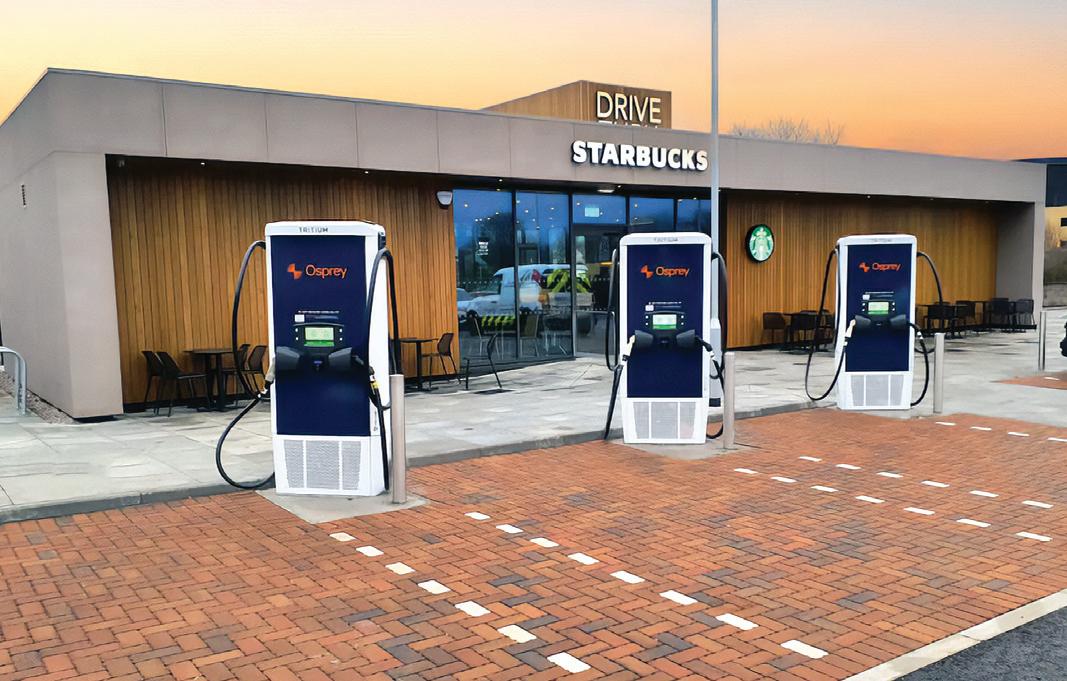

way service operators in England for a RCF pilot scheme. Later in 2024 then shadow transport minister Bill Esterson said an incoming Labour administration would use unallocated funding from the RCF scheme to speed up grid connections.
He wrote on LinkedIn: “We will use the £950m Rapid Charge Fund, which was announced in March 2020 and has yet to be allocated to help with grid connections.”
However, by March this year, The Guardian reported that ministers were considering directing proposed funding away from motorway services. There had been criticism of the fund’s design by some motorway service area and chargepoint operators.
Labour also argued the RCF had never formally been included in budget plans, so the promise was unfunded.
Chancellor Rachel Reeves did pledge £400m over the next five years to support the roll-out of charging infrastructure in this month’s spending review, after announcing £200m for charging in the autumn budget. However, much of that spending commitment will support on-street chargepoints rather than the rapid chargers required for enroute charging.
Ian Johnston, the chief executive of Osprey Charging Network, said: “New funding should be more effectively deployed on projects in prime locations where the grid connection costs render the site unviable – whether A-roads, underserved regions or the small number of motorway locations with unviable grid – rather than gifted to all motorway sites regardless of the costs, as was envisaged under the RCF.”
John Lewis is chief executive
The government has set out its ambition to roll out thousands more local EV chargepoints across England. Future of road minister Lilian Greenwood says that government and industry are expected to install over 100,000 local chargepoints in the coming years. The aim is to make charging easier for drivers without access to off-street parking. These new units will be in addition to the 80,000 public chargepoints already available in the UK.
Over 100,000 new chargepoints are being delivered via the existing government funding from the £381m Local Electric Vehicle Infrastructure (LEVI) Fund.
Lilian Greenwood said: “This government is powering up the
of Char.gy, a company which specialises on-street chargers. He welcomed the £400m pledge, but wondered why the full funding package had been dropped. Lewis said: “The key question now is: couldn’t the full amount have been directed towards the EV effort – whether through the continued roll-out of on-street charging or other consumer incentives – to give people greater confidence to make the switch to electric?”
Sue Robinson, chief executive of the National Franchised Dealers Association (NFDA) welcomed the government’s £400m initiative, but stressed the importance of streamlined processes and collaboration with industry stakeholders to avoid similar pitfalls. Robinson expressed concern over the scrapping of the RCF, saying: “It is disappointing to see the failure of the Rapid Charging Fund, as a robust charging infrastructure is essential to support the growing number of EV drivers.”
Motoring journalist Quentin Willson, founder of the FairCharge campaign, said the full £950m should have been spent on accelerating the switch to electric cars. Willson said: “Withholding unused RCF funds and not diverting them towards other EV charging initiatives isn’t a great look for government. It opens them to the obvious questions about their commitment to the EV transition.”
The promised government funding sits alongside an expected £6 billion in private investment to install tens of thousands of chargepoints by 2030.
The announcement was made when Greenwood visited chargepoint operator Believ. The company announced £300m in private investment for 30,000 new chargepoints across the UK.

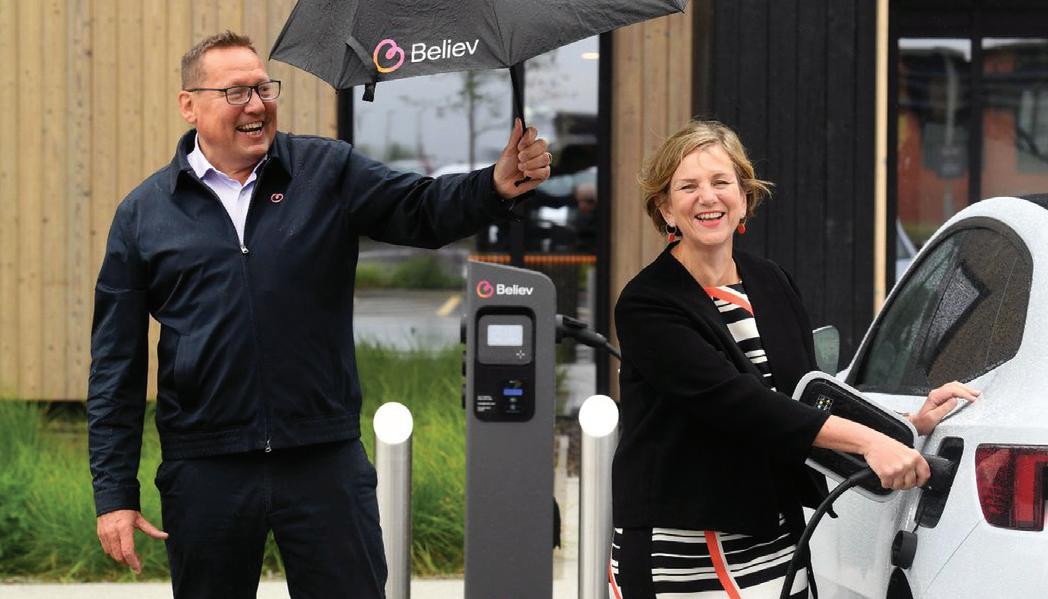
EV revolution by rolling out a chargepoint every 29 minutes and our support to roll out over 100,000 local chargepoints in England shows we’re committed to making even more progress.
“We’re delivering our Plan for
Change by investing over £4 billion to support drivers make the switch, while backing British carmakers through international trade deals –creating jobs, boosting investment and securing our future.”
Guy Bartlett, chief executive of Believ, said: “It’s fantastic to see government and private industry working together to accelerate the EV charging rollout. Collaboratively, we recognise the scale of investment required and the urgency of the need. Confidence in EVs will continue to grow as drivers see more infrastructure going into the ground.”
Government calls for evidence on solar panels in car parks
Supermarkets, retail parks, and offices could save money on their energy bills by turning their car parks into ‘solar carports’, while motorists could benefit from cheaper electric vehicle charging costs through the introduction of solar canopies.
This is the vision the government sets out in a call for evidence on harnessing the potential of installing solar panels in car parks across England, Wales and Northern Ireland.
The government sees mandating solar on car parks as a way of unlocking underutilised space which can be used to power homes and businesses with clean, cheap and secure power.
Energy secretary Ed Miliband has approved nearly 3 GW of new solar capacity since July.
“Right now, the sun is shining on hundreds of thousands of car parking spaces across the country which could be used to power our homes and businesses,” said Miliband.
“We want to work with businesses and car park operators to turn our car parks into solar carports to save families and businesses money with clean, homegrown British energy through our Plan for Change.”
Future of roads minister Lilian


Greenwood added: “We’re committed to ensuring electric car drivers are always close to a charger and can save money when making the switch. Today is another positive example of how we’re harnessing the net zero transition to give drivers more choice and help them get around with greater peace of mind.
“There are now more than 76,500 public electric vehicle charging devices available across the UK, as we continue to deliver our Plan for Change by investing £2.3 billion to help drivers switch to electric vehicles while backing British carmakers and protecting jobs.”
Solar carports are already mandatory in some European
• Bentley Motors’ manufacturing facility in Cheshire is the largest solar carport in the UK, with 10,000 solar panels and a capacity of 2.7 MW. Along with other installed solar arrays and 6.6 MW of battery storage, the car park enables all of Bentley’s manufacturing operations to be powered by solar.
• Eastbourne District General Hospital became the first solar carport to power a hospital, cutting the hospital’s emissions by 222 tonnes in the first year.
• Stourton Park & Ride in Leeds hosts a 1.2 MW solar carport, providing EV charging infrastructure for 26 spaces.
• The Metrocentre in Gateshead has over 5,300 rooftop and carport solar panels providing enough power to supply 40% of their annual electricity usage.
Planning applications are no longer needed to install public or private electric vehicle sockets, the Department for Transport (DfT) has confirmed. The planning changes apply to workplace and public chargepoints, which could increase the number of public chargepoints where businesses allow visitors to use their sockets.
It will also be easier for EV owners with a driveway to install a private chargepoint and power up their EVs at home.
This comes on top of government support that currently allows people renting or owning a flat, and those with on-street parking, to receive up to £350 off the cost of installing a home charger.
Future of roads minister Lilian Greenwood said: “We’re cutting down on paperwork to power up the EV revolution, so that drivers, businesses and those looking to make the switch will have more chargepoints to power from, and less red tape to deal with.
“We continue to make the switch to EVs easier, cheaper and better by investing over
£2.3bn to support drivers and back British carmakers through international trade deals – creating jobs, boosting investment and securing our future as part of our Plan for Change.”
The government funding supported the provision of 18,600 sockets in workplace car parks last year.
The UK now has nearly 80,000 public EV chargepoints available in the UK. DfT statistics show that a record of nearly 3,000 public charging devices were added in April.
The loosening of planning regulations around the installation of EVs has been welcomed by both chargepoint operators and property owners.
Lewis Gardiner, operations director, Osprey Charging Network, said. “This is a hugely welcome and practical change that will make a real difference on the ground. Removing the need for planning permission for essential electrical infrastructure like substations across the majority of sites will save months of delays,
countries, including France and Slovenia, providing their countries with an abundance of cheaper solar power.
Initial estimates suggest that an 80-space car park could save around £28,000 per year in electricity bills by installing solar carports and using all electricity generated.
It has been suggested that companies could also make back the cost of installing solar in car parks by selling energy back to the grid or through longterm power purchase agreements.
Ben Cox, director at Sovereign Centros from CBRE, asset managers of Metrocentre said: “With the largest number of EV charging points of any shopping centre in the country, and over 5,000 photovoltaic panels in action, including those on car ports in the Green and Blue Mall car parks, we have already taken great steps to secure a more sustainable future.
“We welcome the Department for Energy Security and Net Zero’s call for evidence, which will allow us to invest further into these facilities to support the government’s national agenda.”
The Clean Power Action Plan set an ambition of 45 to 47 GW by 2030. It is estimated that ground-mounted solar currently occupies around less than 0.1% of total and area of the UK.
reduce costs, and accelerate the delivery of the rapid charging hubs drivers need. It’s the result of months of collaboration between industry and government, and we’re proud to have played a key role in making it happen.”
Patrick Dunne, Sainsbury’s chief property and procurement officer and managing director of the retailer’s Smart Charge network, said: “Everyone at Smart Charge knows how important it is to make EV charging simple, reliable and accessible –both to make transport cleaner and to ensure we’re meeting the everyday needs of drivers throughout the UK.
“We welcome this new streamlined approach to installing chargepoints, which will help accelerate the nation’s adoption of EVs.”
In parallel, the government has announced that a planning restriction that heat pumps need to be one metre from a neighbour’s property has been lifted. This change is part of the government’s Warm Homes Plan which aims to give 300,000 households upgrades to improve their energy efficiency and lower bills.
Be.EV opens first Charging Oasis site in Manchester
Public EV charging network
Be.EV has opened its new Charging Oasis in Manchester.
What was a derelict petrol station for over 15 years is now home to an ultra-rapid charging hub with twelve 300kW ultrarapid charging bays.
The site, in Failsworth, includes two extra-long bays, an accessible bay, four waiting bays where drivers can park while waiting for a charger, and is home to a Caffè Nero Express.
Failsworth forms part of the ‘Northern Gateway’, one of the six key growth zones outlined in Greater Manchester’s 10-year industrial strategy.
Be.EV has invested £4m to develop the site and has only used local suppliers in its construction.

The site features a top layer of tarmac made from recycled tyres, as well as solar panels.
Recycled bricks form part of the Caffè Nero Express. Recycled water from drainage is also being used in the store and the wild-
Barnet Council is enabling its residents to make the switch to electric vehicles with the roll-out of up to 1,000 on-street chargepoints.
Installations of the first 500 have begun across the north London borough. The remaining 500 units will be installed within three years and will bring the total number of EV chargepoints in Barnet to 2,500.
Delivered in partnership with Char.gy, the installations are focussed on streets and neighbourhoods where demand for EVs is rising, particularly for residents who park on-street and do not have access to home chargers.
The council secured almost £800,000 of grant funding through the Office for Zero Emissions Vehicles’ On Street Residential Chargepoint Scheme (ORCS) to
cover 60% of the cost. The remainder is covered by the Char.gy, so these improvements come at no cost to the council.
The chargepoints are integrated into lampposts to reduce disruption and pavement clutter.
Each unit charges at up to 5kW and will be powered through a Renewable Energy Guarantees of Origin tariff. Residents will be able to use Char.gy’s low-rate Night Tariff to benefit from lower off-peak electricity rates.
Cllr Alan Schneiderman, cabinet member for environment and climate change, said: “Lots more EV chargepoints is great news for Barnet residents. It’s another step in the right direction towards becoming a net zero borough by 2042.”

flower garden and trees on site will also generate a net biodiversity gain of 21.2%.
The wraps for one of the chargers was designed by Srinika Malladi, a year 3 pupil at the Co-op Academy New Islington,
a local primary school, as part of a competition run by Be.EV. The chargepoint operator ran an educational day for the children at the Manchester Charging Oasis to teach them about EVs, EV charging and net zero.
Asif Ghafoor, chief executive of Be.EV, said: “Our flagship site has been a long time in the making, and we’re thrilled that it’s open to the public. It’s taken a lot of hard work to get to this point and is a proud day for everyone in the business.
“This site will change ultrarapid public charging forever. It’s been designed to give drivers exactly what they want – not only amenities to give them a break from driving, but also trees, wildflowers and nature that makes drivers excited to come here and charge.
“The site will also be 50p/kWh going forward, making it the cheapest ultra-rapid charging site in Manchester.”
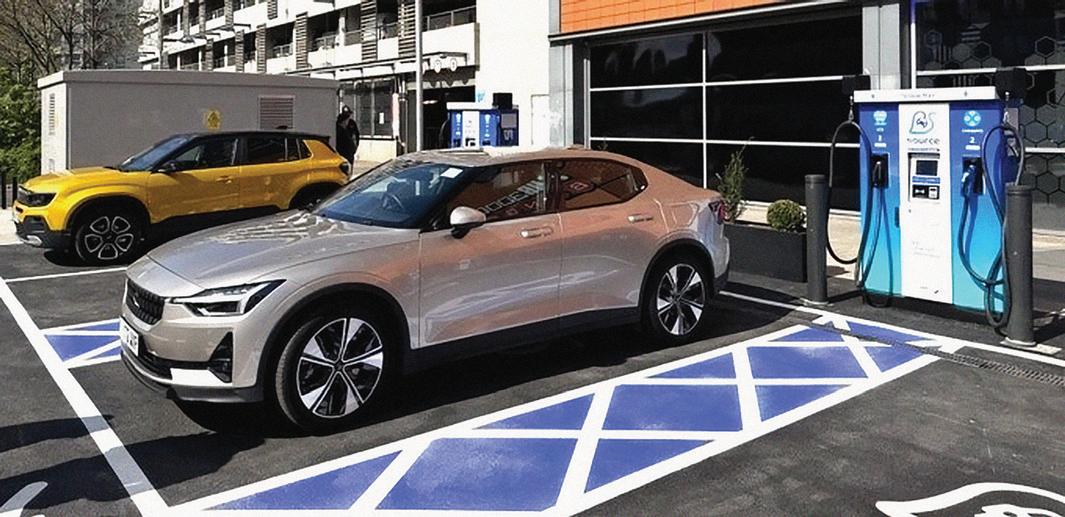
Source-EV opens for business with ultra-rapid hub in Edinburgh
Source-EV, a new chargepoint operator jointly backed by TotalEnergies and SSE, has opened its first ultra-fast charging site in Edinburgh.
The two companies agreed in July 2024 to create a joint venture with the aim of launching a major player in electric vehicle charging in the UK and Ireland. They plan to deploy 300 ultra-rapid sites across both countries.
Located at Ocean Terminal in Edinburgh, the first Source site is equipped with six 160kW ultra-rapid chargers, powered with renewable electricity.
Nicolas Garnier, managing director of TotalEnergies Charging Solutions UK, said: “This first Source-branded commissioning marks the beginning of an ambitious project that we are proud to
undertake with our partner SSE. With more than 72,000 operated chargepoints across Europe, including 32,000 in public charging, TotalEnergies is one of the leading European charging operators and is committed to making electric mobility accessible to everyone. We are fully committed to making Source a leading player in high-power charging in Europe.”
Nathan Sanders, managing director of Distributed Energy at SSE, added: ‘This is a proud moment for SSE and TotalEnergies. Through Source, a strong brand relying on the expertise of both actors, we’re delivering on our ambition to accelerate EV adoption with renewable-powered infrastructure that’s easy to access, easy to use.”
UK Power Networks launches online tool for local authorities
Local authorities can now use an online tool to help them produce their bids for electric vehicle chargepoint funding. UK Power Networks (UKPN) has partnered with Field Dynamics Cenex, and ZapMap to launch the Chargepoint Navigator tool.
ChargePoint Navigator integrates data from electricity networks with local information on where EV chargepoints are most needed in order to help councils write stronger bids for government Local Electric Vehicle Infrastructure (LEVI) funding.
The LEVI fund is designed to help local authorities across England roll out EV chargers in residential areas for locals who do not have access to off-street parking. Bids must show collaboration with the local distribution network operator and prove chargers serve residents who cannot plug in at home.
By using data from Field Dy-


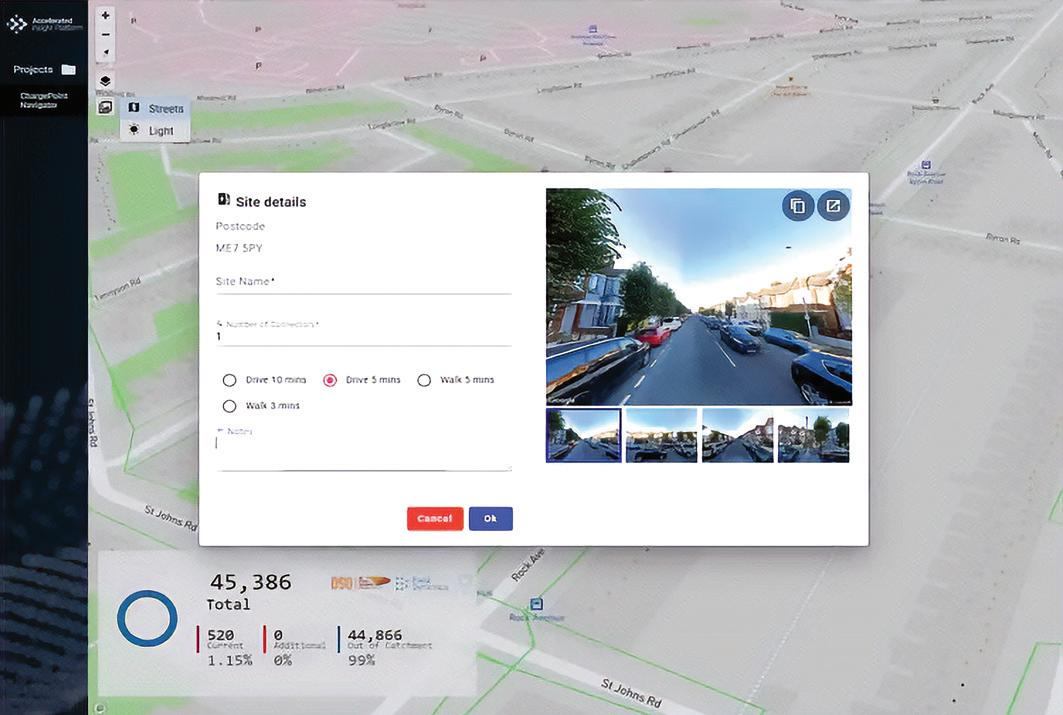
namics, Cenex and Zapmap, and real-time electricity network data with local intelligence on parking and travel patterns, Chargepoint Navigator seeks to help officers demonstrate both technical feasibility and social benefit in a single evidence pack.
Early tests show the effectiveness of the tool, says UKPN. In the recent LEVI funding round, users of the tool saw their success rates in key criteria rise from 30% to 100%.
The tool is now being ex
Electric vehicle charge point operator Believ has secured a £300 million investment facility to install at least 30,000 chargepoints across the UK.
The backers are led by Believ’s joint owners Liberty Global and Zouk Capital, Europe’s leading private equity investor in EV charging, alongside four retail and infrastructure financing banks – Santander, ABN Amro, NatWest and MUFG.
The financing arrangement is designed to cement Believ’s position as a commercially sustainable business, giving confidence to its existing and future local authority and business partners.
Guy Bartlett, Believ’s chief executive, said the funding signifies a major commitment from private industry. “The funding recognises the scale of investment required and the urgency of the need,” he said.
“Confidence in EVs will continue to grow as drivers see more infrastructure going into the ground. At Believ, we are very proud to be at the heart of this journey.”
Jonathan Pearson, chairman
of Believ and chief financial officer of Liberty Growth at Liberty Global, added: “The funding announced today demonstrates the potential of partnering with the public sector in the UK to create the critical EV charging infrastructure required for a greener future. With Virgin Media O2 on board as a delivery partner and leveraging Liberty Global’s financing expertise, we look forward to Believ rolling out much-needed EV chargepoints throughout the UK.”
Much of the investment will be dedicated to on-street, residential locations designed to help drivers without offstreet parking transition to EVs. Significant funding will also be allocated to rapid and ultra-rapid charging hubs as well as rural, underserved locations.
Recent contract wins for Believ include Suffolk County Council, the first awarded and signed Local Electric Vehicle Infrastructure (LEVI) Fund contract. In the private sector, Believ says it has a pipeline of agreed projects to announce.
panded to act as a collaborative platform where local authorities and chargepoint operators can work together on funding applications to streamline the planning and deployment of EV chargepoints.
Lynne McDonald, head of local net zero at UK Power Networks DSO, added: “We’ve listened to local authorities and acted fast to build a tool that helps make their applications a
need and lend significant credibility to their funding bids.”
Craig Stephenson, managing director at Field Dynamics, added: “Effective collaboration is key to building successful public EV charging infrastructure. UK Power Networks’ ChargePoint Navigator exemplifies this, equipping councils with advanced tools and best-in-class data to make informed, strategic decisions.”
Rebecca Walsh, highway operations engineer at Medway Council, has used the tool for planning the deployment of onstreet EV chargers. “Since I started to use UK Power Networks’ ChargePoint Navigator, I’ve found it extremely helpful for planning on-street EV chargers,” she said.
A spokesperson for the Cambridgeshire & Peterborough Combined Authority said: “The tool has been pivotal in providing an evidence-based approach to site selection. We are proud to support such innovative part


























